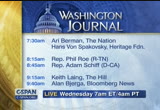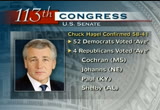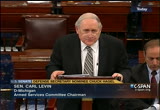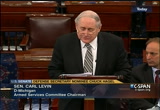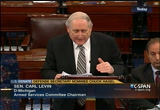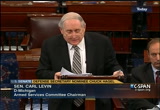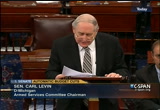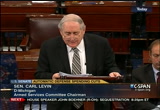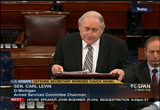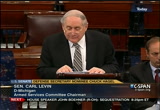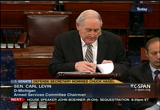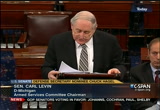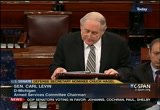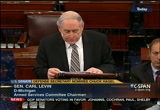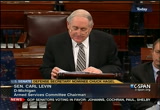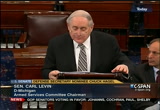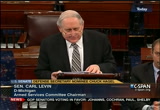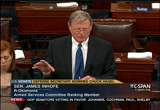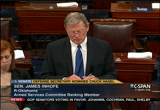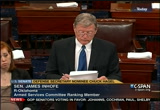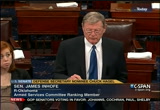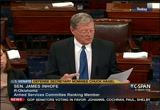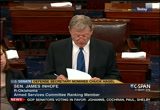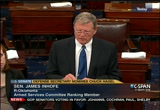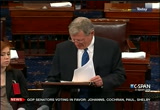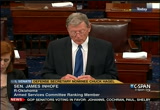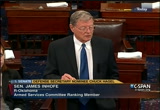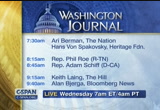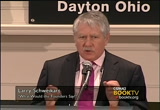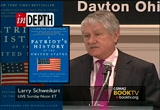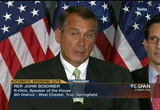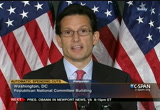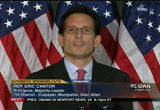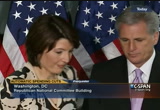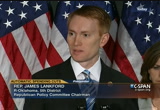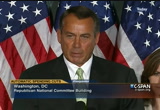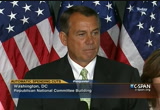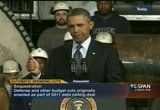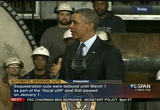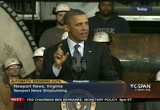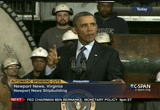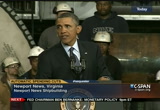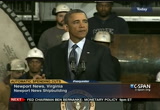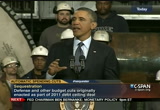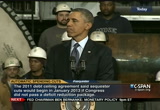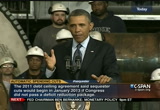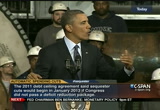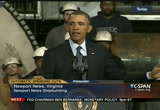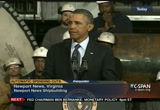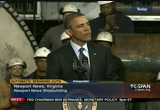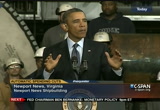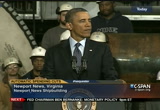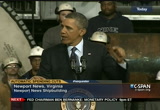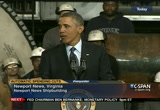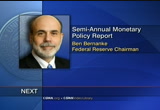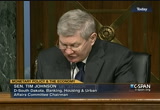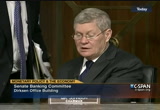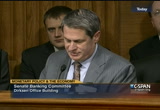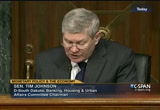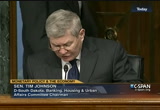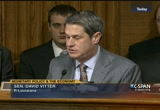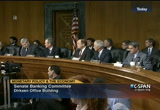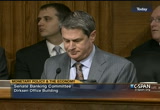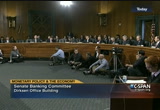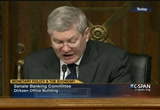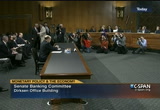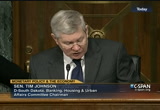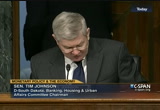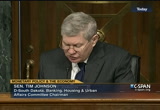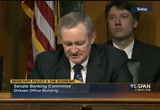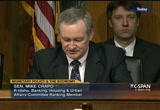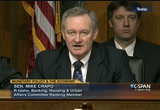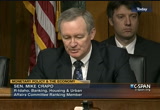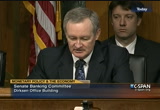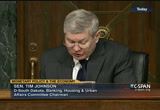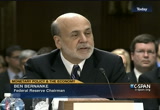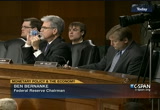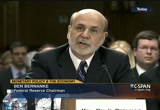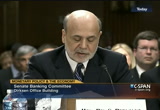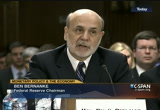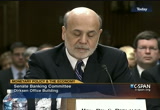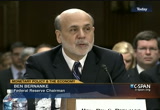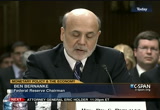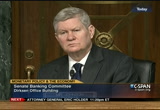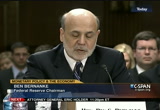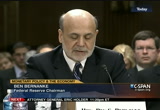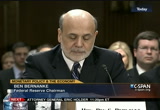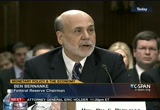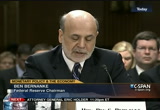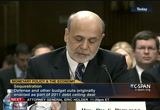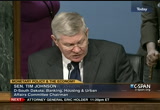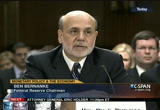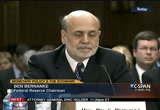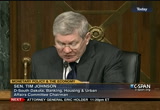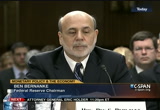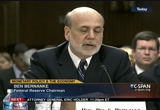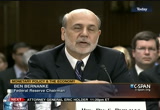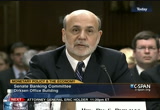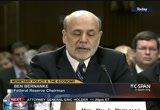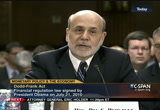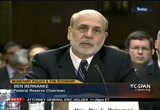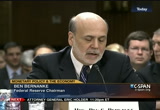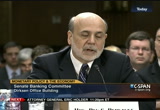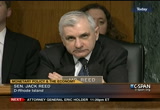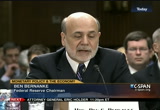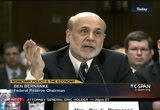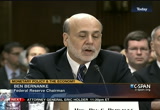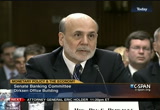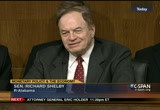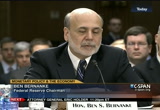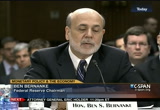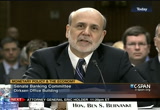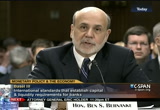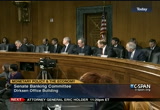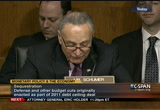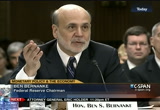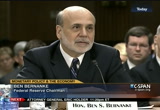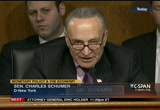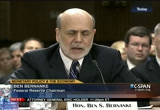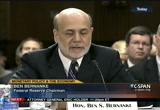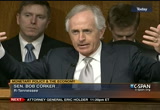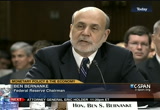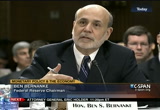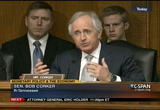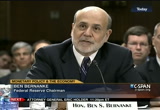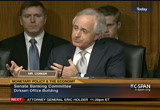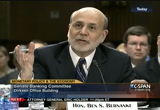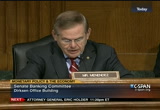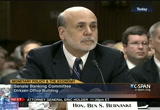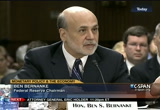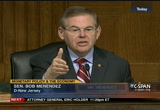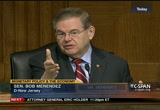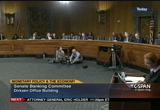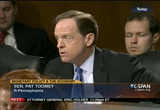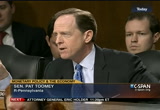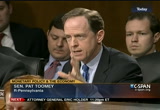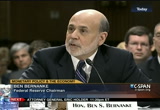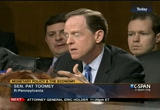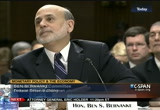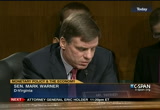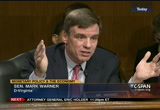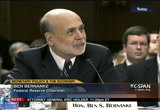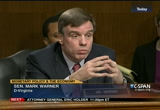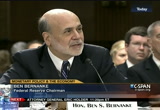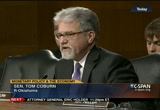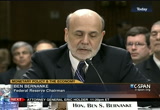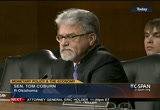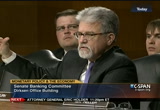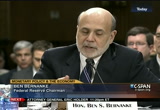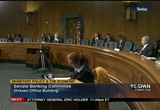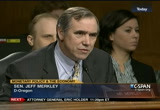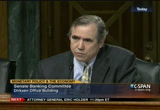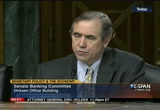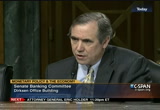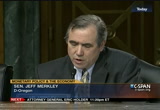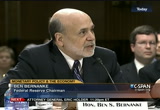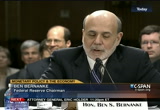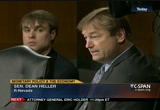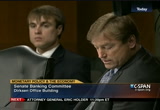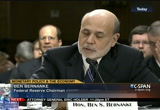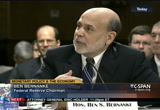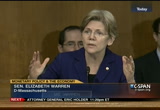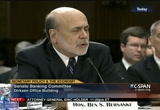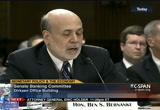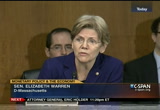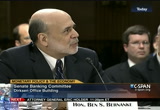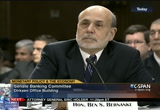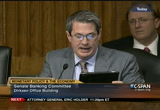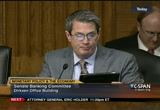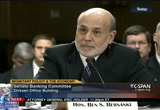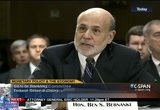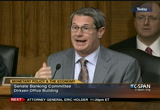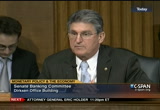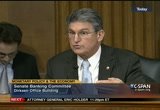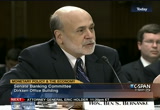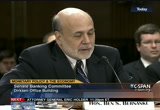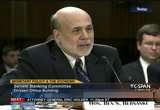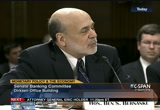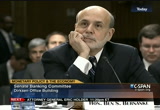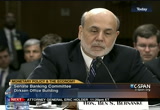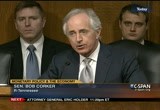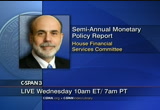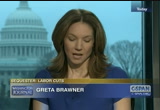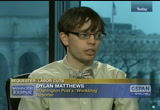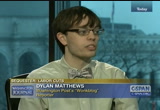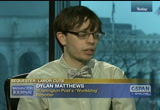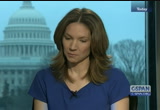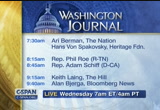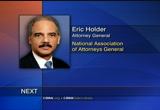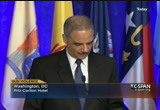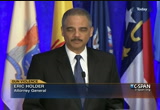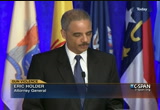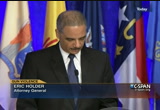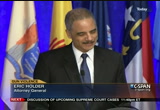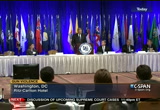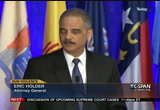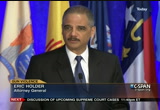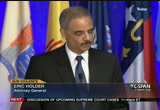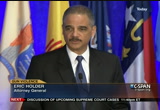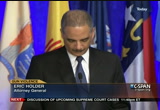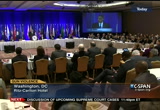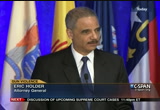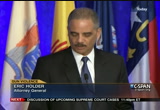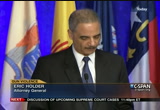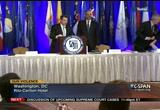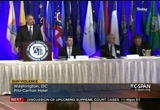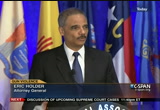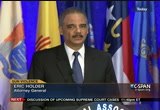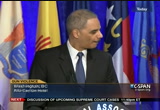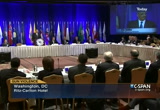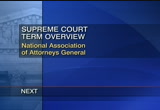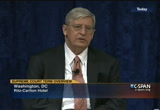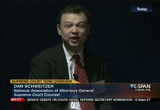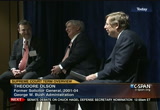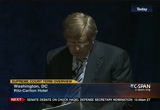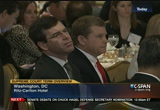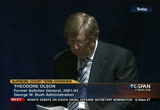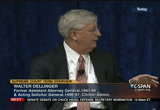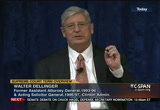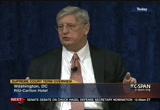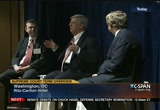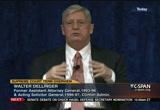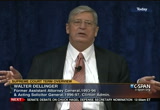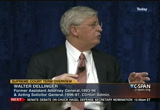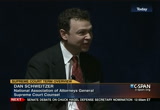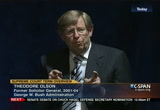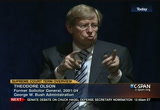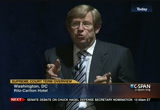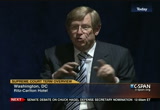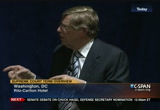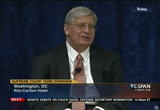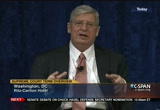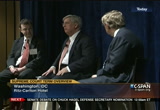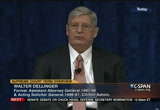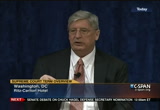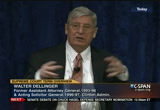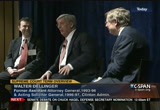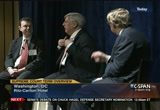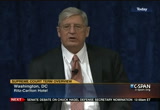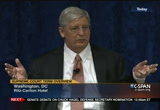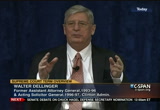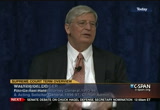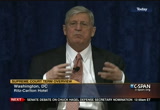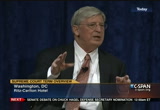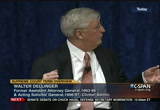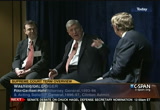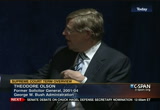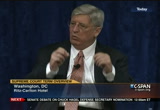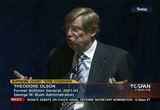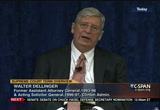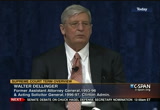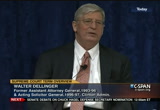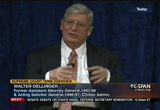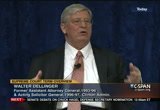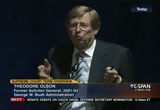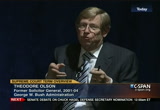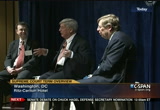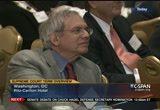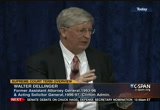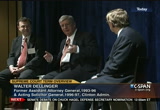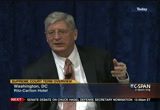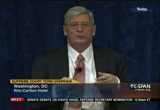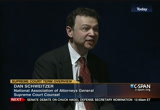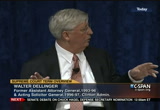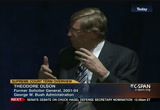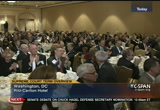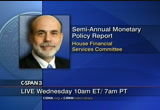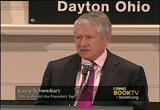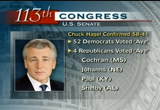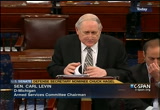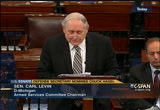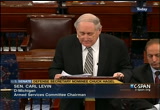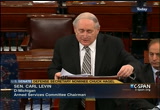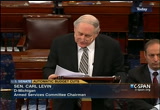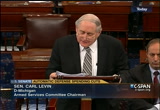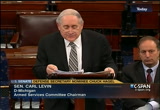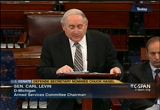tv Capitol Hill Hearings CSPAN February 26, 2013 8:00pm-1:00am EST
8:00 pm
will affect the travel industry. "washington journal" is lye starting at 7:00 a.m. eastern on c-span. >> coming up tonight, the senate approved chuck hagel to be that next defense secretary. after that, republican leaders spoke of the upcoming budget cuts, known as a sequestration. president obama is in newport news, virginia and talks about the effects of sequestration would have on them middle-class. -- on the middle class. the senate voted to confirm senator chuck hagel as the next defense secretary. the final vote was 58-41 with four republicans joining 52 democrats and two independents in voting aye.
8:01 pm
next, the 25 minute debate on the senate floor. >> it is now time for us to vote up or down on the nomination for many reasons. the nomination has been before us now inadequate time to get the information which our colleagues have asked for. there is also the looming fact of sequestration. we need to have a secretary of defense who is not only in office, but whose leadership is not in limbo, but is there. our troops need it. their families needed. our country needs it. we have 66,000 military arsenal in harms way in afghanistan.
8:02 pm
the president of afghanistan has directed the united states to remove its special operations forces from a key afghan province. our military bases key decisions about the pace of the drawdown between now and the end of 2014. the size and composition of a residual force in terms of conditions for the ongoing presence in afghanistan of the united states coalition partners after 2014. at the same time, we face new and growing threats elsewhere, including the ongoing threats posed by iran's nuclear weapons program and the civil war in syria with the risk that there could be loss of that country's substantial stock aloe chemical weapons. there is a growing instability in other countries affected by
8:03 pm
the air of spring, -- of the arab spring. there is a continued on predict it will behavior of the nuclear armed regime in north korea -- of the unpredictable behavior of the nuclear armed regime in korea.ameri this a question -- the sequester, the across-the-board cuts that will affect defense and just about every other agency that we have. those cuts will be disastrous in many ways. i hope we can find ways to avoid them. as of now, the sequester is a real one. it is within a few days. the department of defense has already instituted civilian
8:04 pm
hiring freezes and reduced or eliminated temporary term employees and deferred the silly the maintenance and have begun to cancel -- facility maintenance and have begun to cancel shipments of aircraft and air vehicles. in the next two days, the department will implement additional action, including furloughs for most civilian employees and cutbacks in flying hours and other military training and tessellation of contracts. -- and cancellation of contracts. those contract's have major costs. those are not savings in the long term. we not only was the equipment and the product of the contracts, but we have cancellation costs, which will hit the treasury. the result of these looming cuts are truly devastating. they are serious. for example, the army. sequestration continues, two
8:05 pm
thirds of its brigade combat teams will fall below acceptable readiness levels. the air force says it will not be able to support requirements outside of afghanistan. it will experience significant degradation in its airdrop and feeling disabilities. the navy says that their carrier strike groups will not be ready for scheduled deployments later this year, resulting in a definite extension of the truman and eisenhower appointments, with the resulting impact on morale and retention. hundreds of department defense programs come acquisition programs, research and development projects, might become un-executable because we have insufficient funds. by the end of the summer, the department of defense says it would he unable to pay its tri-
8:06 pm
care bills. to deny that critical healthcare service to military members, families, and retirees -- our men and women in uniform need a secretary of defense that can lead them through these difficult times. they need a secretary of defense to defend the interest in the budget battles that we know are about to come. we need a secretary of defense to speak up and ensure that congress and the country understand the consequences of sequester. if a sequester cannot be avoided, help them avoid the worst of the consequences and two and the impacts as quickly as possible. -- and to end the impacts as quickly as possible. now is not the time to leave the department of defense without a leadership.
8:07 pm
information has been requested appropriately by colleagues about the nominee. information has been provided to the best of the nominee's ability. this falls into two categories -- request for senator hagel's speeches and request for additional financial disclosure. with regard to the speeches, senator hagel and his team have conduct an exhaustive review and provided us with the speeches available to them. also transcripts and video of speeches he has been able to obtain from outside sources. before the recess, i placed on the record links to several other speeches that are found on the internet. and recent days, senator hagel has received additional requests for speeches in the exclusive control of the washington
8:08 pm
speaker's bureau and for access to his senatorial archives at the university of nebraska. on the first point, the washington speakers bureau has informed senator hagel and the department of defense that all speeches given under -- are private off the record and not recorded except in rare cases where a customer request that a recording be kept or archival purposes only -- only for archival purposes only. they cannot confirm which of the clients may have recorded speeches. they cannot be provided to the senate. the university of nebraska holds title to senator hagel's archives. the university has said that
8:09 pm
once the archives are processed and indexed, according to the standards of the society of american archivists, they will be open to the public. until that time, they see the archives will not be open to the public. again, since neither senator hagel or the department of defense has access to the materials, it cannot provide them to as. it is worth noting that the archives cover a period of his service in the senate. senator hagel has an extensive record of speeches and votes during that time in the senate. these are readily accessible to the senators and the public. with regard to financial disclosure, senator hagel's has complied to the conflict of interest rules that have
8:10 pm
applied to hundreds of nominees for senior department defense positions over the course of the last five administrations. despite his compliance with the same disclosure rules that apply to everyone else, there has been innuendos that senator hagel was trying to hide something. for instance, senator hagel has served with a number of distinguished vehicles -- individuals. we have a senator suggested that in the evidence -- without any evidence that the fees he received for his services aimed directly from saudi arabia and or north korea. another senator suggested that we should postpone a vote on a nomination because fox news was going to run a story tomorrow regarding some speeches that were made and paid for by foreign governments that may not
8:11 pm
be friendly to us. that story died before it was aired. it was apparently based on a hoax. these are unfair innuendos. they have been answered. you know they are unfair. senator hagel has an extensive record of service to his country. as a young man, he enlisted in the army thomas served with distinction in vietnam, he served as the deputy administrator of the va during the reagan administration, he was a businessman. many of are bit him during his two terms in that u.s. senate eerie decency left, he has continued to serve -- many of them served with him during his two terms in the u.s. senate before he left. he has continued to serve. senator hagel has been endorsed by five former secretaries of defense, three former
8:12 pm
secretaries of state, and six former national security advisers who served in both democratic and republican administratorions. he has been endorsed by the veterans of foreign wars. he has received this important -- and the non-commissioned officers association. last month, senator hagel was endorsed in a letter signed i sit former u.s. ambassadors to israel -- signed by former u.s. ambassadors to israel. he later stated in part, "we support strongly and without a vacation president obama cozy nominee chuck hagel to be the next secretary -- "we support
8:13 pm
strongly president obama's nominee chuck hagel to be the next secretary of defense." his political courage have impressed us all. he has stood up for what he believes is best for the united states. time and again he has chosen to take a path of standing up for our nation rather than a path of clinical expedients. he has supported the pillars of a strong military, robust ownership, a commitment to the security of israel as a friend and ally, a determination to stop the proliferation of new layer weapons, the defense of human rights as a core principle of america's role in the world. we urge speedy confirmation of chuck hagel. this is next down being -- this is an outstanding patriot.
8:14 pm
if confirmed, senator hagel will be the first former enlisted man in the first veteran of the vietnam war to serve as secretary of defense. his background gives a senator hagel and invaluable respective but only with respect to the difficult decisions and recommendations that a secretary of defense must make regarding the use of force and a commitment of u.s. troops overseas, but also with respect to the day to day decisions a secretary of defense must make to ensure that our men and women in uniform and their families received the support and assistance that they need and deserve. it would be a positive message for our soldiers, it sailors, airmen, and remains to know that one of their own old the highest office in the department of defense. the president needs to have a secretary of defense in whom he
8:15 pm
trusts and would give him independent advice and is a person of integrity and one who has a personal understanding of the consequence of the decisions relevant to the use of military force. senator hagel certainly has is critically important qualifications. he is well-qualified to lead the department of defense. the vote, which is coming at noon, is a vote to invoke and end to the debate so we can hopefully in some future our finally vote on this important nomination and end a situation where this nominee is in limbo and the leadership of the department of defense is uncertain and in limbo as well. the time has come to vote on the nomination of senator hagel. to do that, we must end the
8:16 pm
debate. mr. president, i yield the floor. >> the senator from oklahoma. >> vista president president, i agree with what our established chairman of the committee has said. senator hagel is a brilliant -- has a brilliant military career. i look at my time and his time in the army. that is not the issue here. i think it is interesting that in the debate we had on the floor, all the time and the democrats have talked about his military record. there are some things that have to come out. they are very significant. first of all, what we are going to vote on at noon today is a
8:17 pm
vote that is a simple majority and that will be automatic. those on the hagel nomination must be reflected on the boat that will take place -- vote that will take place at noon today. we are a little bit scarce on time. let me make it real clear -- this is a vote that makes a difference. if they are able to get 60 votes for the hagel nomination, then it is over. i do want to say a couple of things for lawyer vacation. -- clarification. one is a 60 vote threshold. i have been listening to some of the pundits on television.
8:18 pm
one of my a rate is one of the far left on television -- one of my favorite is one of the far left on television. she was saying that this is something that had never happened before. we never had a 60 vote margin. that is not true. it happens all the time. it is a normal thing. that is how significant this confirmation is. and not go for a long amount of time. i will go over some of these. kathleen sebelius, for example, 60 vote margin. 1 -- backinteresting when president bush was a republic -- was the president, he nominated stephen johnson to be the epa administrator. stephen johnson was a democrat.
8:19 pm
the other side had been saying no, we will demand this. they got a 61 vote from that. simmer the secretary of interior. the idea that this is the first time is not right here and i would appreciate it if people would be a little bit more honest when they are looking at that issue. they also have said that we are -- no one is more sensitive or have spent more time talking to troops than i have. we do need a confirmed as secretary of defense. leon panetta says he will serve his time in till a new one is confirmed. if we can come up with 60 votes , -- i called up leon panetta
8:20 pm
not too long ago. i say, why don't you agree to run again? he has family reasons and i certainly understand. another said she had one. ash carter. a lot of them out there that could be confirmed in a matter of minutes. i would be right there with them in order to help that to take lace. i want to say something. sometimes people do not understand. i had someone go back and research of this. i do not have the background on this erie it started back -- on this. back then they use the term of
8:21 pm
approbation or rejection of the senate. it means the same thing. it has been going on for a long time. hamilton talked about it. this is the rejection that they used at the time eri. where are we today? certainly the chairman of the armed services committee is one of the strongest supporters of consent. he has said that it is shocking and sad that the senate might vote on this nominee while senators are being denied critical and relevant information. the ranking member or the leader of the senate has said many times that raising impression that the nominee and the white house have something to hide is going in reverse.
8:22 pm
it goes on and on with different words on the significance of the role the senate has. john kerry has says what the senate has to decide is whether it will stand for the rights of the committee. senators ought to respect that ranking members have requested and those requests have not been fulfilled. one of the new senators, one whom i have learned to have a great deal of respect for, i was talking him last night and said, you you ought to come down and let them know why it is that you are not speaking on this. he said, look, what can i do? i have requested over and over again or information -- for information on our nominee for secretary of defense.
8:23 pm
i have been denied, stonewalled. what else can i say? maybe it sounded extreme. members should be able to get information that they are entitled to. he has not received that information. that is a very critical thing. what i want to do in the short time that i have left -- by the way, i would ask consent is senator coach could be acknowledged for five minutes. object -- >> the problem i had was not really with the information. i did not request any additional
8:24 pm
information. many members did on the republican side did and did not receive the information they asked for. that was the case with senator cruz. i had a different reason. i think highly of senator hagel. he was in the vietnam war and was a hero. what is his philosophy? he was one of two that voted against sanctions for iran. he voted against an effort to make iran revolutionary guard -- he was one of only four that refused to sign a letter of solidarity with israel.
8:25 pm
he looks at the days of having a nuke free world. that sounded good back in the days of the cold war. back then we had two superpowers. we knew what they had. that does not mean anything to the man in the middle east. we understand that good global zero sounds good but you have to realize you have countries like iran who even our nonclassified intelligence say will have the capability and the delivery system by 2015. this is something that is not like it used to be. i'm concerned that. i was shocked. i have to thank the chairman of the committee. the years i served on the armed services committee, i have never seen a come before, but he allowed a member of the committee to use a video -- i have never seen a gun before,
8:26 pm
but he allowed a member of the committee to use a video. it had an al jazeera interview where he agreed with their position -- he being senator hagel. it has committed war crimes against israel. the world'sis's bully. that is still very much a concern of mine. >> on the next "washington journal" a case being argued before the supreme or. our guests -- of the supreme court. man and guess are ari bern hans von spakovsky. later, keep laying of the hill.
8:27 pm
-- keith laing from the hill/ "washington journal" is like starting at 7 a.m. on wednesday on c-span. >> wednesday, ben bernanke will be delivering his semiannual monetary policy report before a house financial services committee. we will be live with the second day on capitol hill starting at 10 a.m. eastern on c-span 3. >> you have to understand that all of the founders primary concern was with national security. what would they say, for example, about a company such as locking? -- lockkey?
8:28 pm
they would have grudgingly favored a bailout because it supplied the united states at the time with its top fighter jets and top recon airplanes. you could make an argument that they would have supported the bailout of chrysler back in the 1980s but not the bailout of chrysler today. what is the difference? chrysler back then made tanks. in fact, they were our only tank manufacturer. when chrysler comes out of debt and repays a government loan and comes back to health, they sold off the tank division and piling that money back into the company. >> author and professor larry schweikart will take your phone calls, and e-mails, and tweets. life on sunday at noon on "book tv" on c-span 2.
8:29 pm
>> house republican leaders said the president and senate democrats responsibility for avoiding the budget cuts. house speaker john boehner says it is time the senate gets off their asked and pass a bill. -- "off their ass and pass a b ill." this briefing is 10 minutes. >> the president, as you are all aware, insisted that we do not have to go over the debt ceiling twice and insisted that the backstop for the work of the supercommittee be the sequester. but i don't think the president's focused on trying to find a solution to the sequester. the president has been traveling all over the country, and today going down to newport news in order to use our military men and women as a prop in yet another campaign rally to support his tax hikes. now, the american people know the president gets more money he'll spend it.
8:30 pm
the fact is he's gotten his tax hikes. it's time to start focusing on the real problem here in washington and that's spending. the president has known for 16 months that this sequester was the president has known for 16 months that this sequester was looming out there. when the supercommittee failed to come to an agreement. for 16 months the president has been traveling all over the country holding rallies instead of sitting down with senate leaders in order to try to forge an agreement over there in order to move a bill. we have moved the bill in the house twice. we should not have to move a third bill before the senate gets off their ass and begins to do something. >> good morning. the speaker said the president's going to be in newport news, virginia, and talking to families in the commonwealth. i tell you, i'm concerned about families in the commonwealth. i'm concerned because they're concerned about their future and the uncertainty which looms because of this sequester.
8:31 pm
now, the president has said, well, he wants a compromise, but if you take a look what's going on, there's been four years of spending increases and now the president says, we can't have any progress on this sequester unless we get the second tax hike in eight weeks. that's not compromise. then he says, your choice is going to be taking criminals off -- letting criminals out of jails and onto the streets or give me a tax increase. that's not compromise. that's a false choice. you know, we have tried in the house, as the speaker said, again to bring forward measures that actually accomplish reform and cut spending. we've even taken things that the president had in his very own budget to say, please join us, and he won't accept those proposals unless we raise taxes. now, it's time for the senate to come together with us, sit down with the president and let's get this resolved for the american people.
8:32 pm
>> as many of you know, you've heard about this argument for quite sometime. let's put it in perspective. this idea came from the white house when the house passed the bill twice, what did the president do? he threatened to veto if we dealt something different on sequestration. now as the time looms, the president does exactly what he continues to do. he does a road show. the fundamental question here the president has to decide, does he want to be president of a political party or does he want to be president of the united states? it is time for leadership. it is time for him to engage and come down one mile, deal with the senate if he really wants to lead. >> we are three days away from the president's plan unless the senate takes action. the president proposed the sequester, the across-the-board
8:33 pm
cuts that disproportionately impacts our military, and now he's on the road in newport news today, over 180 miles from washington, d.c. he's traveled over 5,000 miles the last two weeks, and we challenge him, mr. president, travel a mile and a half up here to capitol hill, sit down with harry reid and urge the senate democrats to take action. the president says this is a bad idea, but yet he's not put forward an alternative idea. the republicans in the house have twice taken action, twice passed legislation. the first time 300 days ago. what we need is for the president to stop using this as an excuse to raise taxes and turn it into an opportunity to start saving taxpayer dollars, start spending money more wisely. the american people, moms, dads, seniors, college students, children, they shouldn't be
8:34 pm
forced to lose their jobs or lose the opportunities that this country has to offer. it's time to get serious about the spending, and we need the president to lead and get off the campaign trail. >> a proud kansan by the name of william allen white once said something to the effect that the truth will always come out as the facts are fairly and honestly on display. so let's review the facts. the facts are the sequester was the president's idea. it's a fact the house has twice passed legislation to replace the sequester with smarter cuts and reforms. it's a fact that the senate has twice rejected our replacement and has set up another financial crisis. and it's a fact that the president threatened to veto any replacement to the sequester. it's also a fact that these cuts amount to about 2.5% of the federal budget.
8:35 pm
find me an american family, a hardworking taxpayer that hasn't already cut over 2% out of their budgets at home without cutting essential things. there's a fact that says that we are going to take in more money this fiscal year than we have ever taken in before. the budget this year, we will spend more money this year than we spent last year even if the sequester goes into effect. we will spend more money even if the sequester goes into effect. the fact is when we accepted the president's sequester 18 months ago, we made a deal. a dollar for cuts for a dollar of spending -- debt limit increase. if you wants to do the bait and switch now, we will have lied to our constituents by replacing those with tax increases. this leads you to the truth and the truth is the president needs to come back from his campaign-style tour, stop
8:36 pm
scarring people and work with us -- scaring people and work with us and get people back to work. >> yeah, we've aid said the across-the-board spending reduction needs to be more targeted. that's why the house passed something last may to replace the sequester. that's why the house also passed in december last year to say this is a better way to do it. we have overspent the federal budget by $1 trillion now five years in a row. we cannot continue to do that. and so this perpetual statement of let's just postpone it, let's delay it another month is the wrong way to do it. as has already been mentioned, this year will now be the highest amount of revenue in the history of the country. with the tax increases that just came onboard of the fiscal cliff of negotiations, now tax revenue will be the highest ever in the history of the nation. this is not an issue if we have a little more in taxes we will solve this, we are spending more
8:37 pm
than we ever have. we have got to slow down our spending to stabilize our economy so american families are not dealing with the crisis they're dealing with. >> mr. speaker, i wanted to ask you if you think your position will be emboldened if you voted a third time. every time you talk to a house democrat they say these two votes in the last congress, their numbers have changed. they were narrow votes. >> it's time for the senate to act. it's not about the house. we've acted. where's the president's plan to avoid the sequester? have you seen one? i haven't seen one. all i've heard is he wants to raise taxes again. where's the president's plan? where is the senate democrats' plan? i want to see it. >> mr. speaker, you talked about the regular order of things. i spoke to -- no intention to be here friday or over the weekend
8:38 pm
if the sequester hits. if the president is successful, why not have the house ready to go to conference -- >> if the senate acts i'm sure the house will act quickly. >> if the sequester hits? >> if the senate acts i'm sure the house will act quickly. >> giving the president flexibility on the sequester [inaudible] >> you know, our goal is to make sure that the government is in fact funded, that there's no threat of a government shutdown. and we've been working with our members talking with our colleagues in the senate about how best to enact a continuing resolution to keep our government funded. >> last question, mr. speaker. you said the president has been campaigning all day. all you guys have been doing is press conference. i understand you want the senate to act. don't you end up looking like -- >> the house has done its job. we've passed a bill twice to replace the sequester. when are they going to act? when's the senate going to
8:39 pm
act? where's the president's plan to replace the sequester? i'm anxious to see it. thanks. >> president obama today called on congressional republicans to compromise with democrats to avoid automatic spending cuts during the sequestration. with three days before the march 1 sequestration deadline the president traveled to newport news, virginia. this is 20 minutes. >> hello newport news! [cheers and applause]
8:40 pm
>> well, it is good to see all of you here today. i want to thank your c.e.o. for showing me around. i usually don't get a chance to hang out with nuclear submarines, especially submarines that my wife has sponsored. so right there, that was worth the trip. but most importantly, it's a great chance to see the incredible men and women who every single day are helping to keep america safe and are just the bedrock of this country's manufacturing base. thank you to all of you. [cheers and applause] >> i want to thank our outstanding secretary of the navy. [applause] >> there he is right there. good-looking guy. i want to thank your mayor, mckinley price, who served his
8:41 pm
nation proudly. [cheers and applause] >> i want to thank two outstanding congressmen who care about this facility, care about virginia and care about the country. congressmen bobby scott is here. [cheers and applause] >> and congressmen scott rigell as well. [applause] >> the reason i came here today in addition to seeing just some incredible stuff -- it's true, every time i come to these places, i don't know how you all do it. it is just amazing work. but the main reason i'm here is to call attention to the important work that you're doing on behalf of the nation's
8:42 pm
defense and to let the american people know that this work, along with hundreds of thousands of jobs, are currently in jeopardy because of politics in washington. in a few days, congress might allow a series of mediate, painful, arbitrary budget cuts to take place, known in washington as the sequester. that's a pretty bad name, sequester, but the effects are even worse than the name. instead of cutting out the government spending we don't need, wasteful programs that don't work, special interest tax loopholes and tax breaks, what the sequester does, it uses a meat cleaver approach to gut critical investments in things
8:43 pm
like education and national security and life-saving medical research. and the impact of this policy won't be felt overnight, but it will be real the sequester will weaken america's economic recovery. it will weaken our military readiness. and it will weaken the basic services the american people depend on every single day. already the uncertainty around these cuts is having an effect. companies are starting to prepare for layoff notice. families are planning to cut back on expenses. and the longer these cuts are in place, the greater the damage. so here, at newport news shipbuilding, you guys have made an enormous investment because
8:44 pm
we've said in order to maintain the finest navy the world has ever known, we want to make sure there is an orderly process whereby we are continually upgrading our ships, building new ships, maintaining our ships properly, and these are some big ships. so it's expensive. and it's complicated and you have 5,000 pliers all across the country. and you have to have some certainty and knowledge about how things are going to proceed over the long-term for mike and others to plan properly. so you're rightly concerned. mike is concerned about the impact these cuts will have on not just this company, but companies and small businesses from all 50 states to supply you with parts and equipment. mike has told me you have already made $1 billion with a capital investment and you recruit and hire new people.
8:45 pm
those aren't commitments you make lightly. you have to have the capacity to plan and have some certainty in terms of what we're going to be doing. and you know that if congress can't get together and plan our nation's finances for the long-term, overtime, some of your jobs and businesses could be at risk. over the norfolk naval station, the threat of these cuts has forced the navy to cancel the deployment or delay the repair of certain aircraft carriers. one that's currently being built might not get finished. another carrier might not get started at all, and that hurts your bottom line. that hurts this community.
8:46 pm
that's money out of their pockets. money out of their paychecks. and then that means there's going to be a ripple effect on thousands of other jobs and businesses and services throughout the commonwealth, because approximate they don't have money in their pockets or less money in their pockets, that means they're less able to afford to buy goods and services from other businesses. so it's not just restricted to the defense industry. all told, the sequester could cost tens of thousands of jobs right here in virginia, but it doesn't just stop there. if the sequester goes into effect, more than 2,000 college students would lose their financial aid. early education, like head start and early start, would be eliminated for nearly 1,000 children and 18,000 fewer virginians would get the skills they need to find a job. across the country, these cuts
8:47 pm
will force federal prosecutors to close cases and potentially let criminals go. air traffic controllers and airport security will see cutbacks and that could cause delays at airports across the country. tens of thousands of parents will scramble to find childcare for their kids. hundreds of thousands of americans will lose access to primary care and preventive care like flu vaccinations and cancer screenings, including more than 3,500 children right here in virginia. so these cuts are wrong. they're not smart. they're not fair. they're a self-inflicted wound that doesn't have to happen. now, the reason that we're even thinking about the sequester is because people are rightly concerned about the deficit and the debt.
8:48 pm
but there is a sensible way of doing things, and there's a dumb way of doing things. i mean, think about your own family, right. let's say suddenly you have a little less money coming in. will you say, we'll cut out college tuition for the kid, we'll stop feeding the little guy over here, we won't pay our car note even though that means we can't get to work? that's not what you do, right? you step back and you say, what is it that's important? our child's education, making sure they're healthy, making sure we can get to the job, keeping our house, you know, repaired and then you say, here are the things that aren't so important and you cut those out. you prioritize and you make smart decisions. well, we should be doing the same thing. now, i've laid out a plan that details how we can pay down our deficit in a way that's balanced
8:49 pm
and responsible. we have the plan right on a website, the white house website. everybody can go see it. it details exactly how we can cut programs that don't work, how we can raise money by closing loopholes that are only serving a few as opposed to the average american. we detailed $930 billion in sensible spending cuts that we're willing to make and $580 billion in wasteful tax loopholes and deductions that we're willing to eliminate through tax reform. and what i've said is if the republicans in congress don't like every detail of my proposal, which i don't expect them to, i've told them my door's open. i'm more than willing to negotiate. i want to compromise. there's no reason why we can't come together and find a sensible way to reduce the deficit over the long term
8:50 pm
without affecting vital services, without hurting families, without impacting outstanding facilities like this one and our national defense. there's a way of doing this. and the fact is there are leaders in both parties throughout this country who want to do the same. i've got to give scott rigell credit. he's one of your republican congressman that's here today and that's not always healthy for a republican being with me. the reason he's doing it is because he knows it's important to you and he's asked his colleagues in the house to close tax loopholes instead of letting these things go through. he wants to make tough cuts but he wants to do it in a smart way. bobby scott, same thing. some of the cuts we proposed,
8:51 pm
bobby might not think are perfect but he knows we got to make some tough decisions. he just wants to make sure that you are not the ones adversely impacted and we're sharing down the sacrifice in bringing down the deficit, we're not just dumping on a few people and not doing it in a dumb way. senators like john mccain have made similar statements to what scott said. your republican governor, along with other governors around the country, said they want congress to stop the sequester, stop these cuts. but i just have to be honest with you. there are too many republicans in congress right now who refuse to compromise even an inch when it comes to closing tax loopholes and special interest tax breaks. and that's what's holding things up right now. keep in mind nobody's asking them to raise income tax rates. all we're asking is to consider closing tax loopholes and deductions that the speaker of
8:52 pm
the house, john boehner, said he was willing to do just a few months ago. he said there were a bunch of loopholes and deductions you could close. said you could raise $800 billion, $1 trillion by closing loopholes. we're not even asking for that much. all we're asking is that they close loopholes for the well-off and well connected, for hedge fund managers or oil companies or corporate jet owners who are all doing very well and don't need these tax loopholes so we can avoid laying off workers or kicking kids off head start or reducing financial aid for college students. i don't think that's too much to ask. i do not think that's partisan. the majority of the american people agree with me. the majority of newport news agrees with me. we need to get this done. [applause] but the choice is up to congress. only congress has the power to
8:53 pm
pass a law that stops these damaging cuts and replaces them with smart savings and tax reform. and the second i get that bill on my desk i will sign it into law, but i got to get congress to pass it. none of us will get 100% of what we want. democrats, they've got to, you know, make some tough choices too. democrats like me, we've said we're prepared to make some tough cuts and reforms, including the programs like medicare. but if we're willing to compromise, then republicans in the house have to compromise as well. that's what democracy's about. that's what this country needs right now. so -- [applause] let me just make one last point, by the way, for those who are following this. lately some people have been saying, well, maybe we'll just give the president some
8:54 pm
flexibility. he can make the cuts the way he wants them, and that way it won't be as damaging. you know, the problem is when you're cutting $85 billion in seven months, which represents over a 10% cut in the defense budget in seven months, there's no smart way to do that. there's no smart way to do that. you don't want to have to choose between -- let's see, do i close funding for the disabled kid or the poor kid? do i close this navy shipyard or some other one? when you're doing things in a way that's not smart, you can't go on with the pain and the impact it's going to have on the economy. the problem is, virginia, we can't cut our way to prosperity. we can't just cut our way to
8:55 pm
prosperity. we can't ask seniors and working families like yours to shoulder the entire burden of deficit reduction while asking nothing more from the wealthiest and most powerful. we're not going to grow the middle class just by shipping the cost of health care or college on the families that are already struggling or forcing communities to lay off more teachers or cops or firefighters or shipbuilders and then folks who are doing really well don't have to do anything more. that's not fair. and it's not good for the economy. and the other thing we got to do is stop having these crises manufactured every month. seems like -- i know you guys must get tired of it. didn't we just solve this thing? now we got another thing coming up? [applause] i mean, the thing if mike peters ran his business this way. once every month or two there
8:56 pm
would be some crisis and you wouldn't be sure whether or not you were working or not. even if it got solved, eventually or ultimately it would be pretty discouraging on people. you would be less productive. ships wouldn't get built as fast. you'd waste money because you don't know exactly what to expect. folks aren't sure. am i showing up today or not? if it's not a good way to run a business, it's sure not a good way to run a country. [applause] now all of you, the american people, you've worked too hard for too long rebuilding and digging our way out of the financial crisis back in 2007 and 2008 to just to see congress cause another run. -- one. the greatest nation on earth
8:57 pm
can't keep on conducting its business, drifting from one crisis to the next. we got to have a plan. we got to invest in our common future. our true north is growing an economy that creates good, middle-class jobs. it provides the people the skills it needs to get those jobs and making sure you're getting paid a decent wage to support your families. that's what we should be focused on, not weakening the economy, not laying people off. [applause] that's what we should be talking about in washington. and if you agree with me, i need you to make sure your voices are heard. let your leaders know what you expect of them. let them know what you believe. let them know what this country was built on was a sense of obligation to not just each other but to future generations, that we got to shoulder those
8:58 pm
obligations as one nation and as one people. you know, i was in a conversation with some of the governors from across the country yesterday, and i told them. i said, i have run my last election. michelle is very happy about that. [laughter] i'm not interested in spend. i'm not interested in playing a blame game. at this point all i'm interested in is solving problems. all i'm interested in is making sure there when you get up early in the morning and get to this shift at 5:30 in the morning that you know if you do a good job and if you work hard and if you're making sure that all the parts of this incredible ship that you're building is where they need to be, if you're doing
8:59 pm
what you do, then you can go home feeling satisfied, i did my job, i did my part, i can support my family, i can take pride in what i've done for this country. that's all i want. i want us to look back five years from now, 10 years from now and say we took care of our business and we put an end to some of these games that maybe i guess are entertaining for some but are hurting too many people. but in order for us to make that happen, i'm going to need you. the one thing about being president is after four years you get pretty humble. you'd think maybe you wouldn't but actually you become more humble. you realize what you don't know. you realize all the mistakes you make. you realize you can't do things by ourself. that's not how our system
9:00 pm
works. you got to have the help and the good will of congress. and what that means is you got to make sure that constituents of members of congress are putting some pressure on them, making sure they're doing the right thing, putting an end to some of these political games. so i need you, virginia, to keep up the pressure. i need you to keep up the effort. i need you to keep up the fight. if you do, congress will listen. if you stand up and speak out, congress will listen. and together we will unleash our true potential and we'll remind the world just why the united states builds the greatest ships on earth and is the greatest nation on earth. thank you. god bless you. god bless the united states of america. [captioning performed by the national captioning institute] [captions copyright national cable satellite corp. 2013] ♪
9:03 pm
♪ >> on c-span tonight, ben bernanke delivers and monetary policy report and economic outlook. then and attorney general winter meeting with eric holder. followed by a discussion on cases heading to the supreme court. a subcommittee examines the u.s. citizenship and immigration even verify -- e-verify program.
9:04 pm
we will be live starting at 2:30 p.m. eastern on c-span 3. >> people were traveling on route 66. traveling for fun or looking for a job. maybe they were on the way to the grand canyon are working in agricultural fields. people thought route 66 was a way to get somewhere. your destination was out in california. after all of these snake pit started popping up and tourist ands and cafés and motels trading posts, indian trading post, it almost became like a big amusement park along route 66. route 66 became the destination. it was not like let's go to the
9:05 pm
beach in california. it was more like let's go to route 66. >> get your kicks on route 66 in albuquerque, new mexico. one of the places you will see this weekend on book tv, american history tv. look behind-the-scenes on the history and literary life in albuquerque. saturday at noon eastern on book tv, american history tv on c- span 3. >> should sequestration take effect on friday, ben bernanke cautioned that these automatic cuts would be a drag on economic recovery and the high unemployment rate. the fed chairman said before a committee on tuesday and give them a policy report and economic outlook. he will report the same report on wednesday. this is two hours.
9:06 pm
[gavel] >> the committee will come to order. before we proceed with the hearing, the committee will briefly meet in executive session to adopt the committee rules of procedure, budget resolutions, and jurisdictions. neither are the ranking member made any amendments to the current committee rules here an. i know we have been part of the senate wide a partisan process over the last several months to conform to certain standard questions to be asked of all
9:07 pm
committees. that integration process is still ongoing. the working member and i have agreed to withhold for now i'm proposing any changes to the current committee questionnaire -- are proposing any changes to the current committee questionnaire. any proposeals forward move to a vote? -- before we moved to a bow? -- vote? if they are none --
9:08 pm
i understand that a senator has an amendment. senator, you have an amendment? >> thank you, mr. chairman. sorry i'm slightly late. this amendment is simple because of the enormous changes brought on by dodd frank and the significant because of that to this committee from the secretary of treasury and his responsibilities under dodd frank. this was an amendment to the committee rules and ask the chairman to invite any nominee
9:09 pm
to that position starting with to testify mr. loew before this committee. it would not involve any sort of vote regarding the nomination. it would regard full testimony i what he gives before other committees like finance. >> i understand that senators interest in inviting jack lew to testify for this committee. i do not think it is necessary to mend the committee rules to accomplice that -- accomplish that goal. changing the rules would be a mistake. i want to assure that a senator 's interest for mr. lew on a ridge of issues has made clear that i intend to invite him before the kennedy soon after he
9:10 pm
is confirmed. but finance committee has primary jurisdiction over his finan nomination. second, i do not think we should start down the path of trying to mend the committee rules depending on our individual preferences for a particular hearing. that is why we consult with the ranking member and other members of hearings. eric, i'm concerned that amending our rules in this way -- third, i'm concerned that mending our rules in this way -- no senate committee has such a rule. finally -- >> i'm sorry. >> the proposed rules change is
9:11 pm
unworkable. i urge my colleagues to uphold this amendment. >> mr. chairman, if i could respond briefly and maybe suggest a middle ground. first, i think a formal rule change is appropriate because of dodd frank and the enormous significance of that treasury secretary to matters under the direct jurisdiction of this committee. that is a permanent change. be that as it may, i would be happy to withdraw this amendment if the chairman would invite mr. lew to testify before his confirmation.
9:12 pm
>> the process is already moving. i assure that the senator that we will invite him as soon as his confirmation is complete. >> ok. i will take that as a no, but i would still like a vote on my amendment. >> with that, if there is no further debate, the question occurs on the amendment. all in favor, say aye. >> could i call for a roll call vote? >> yes. >> the court will call the roll. >> i'm sorry -- i'm understanding that you will invite mr. lew and he has agreed
9:13 pm
to come and the only debate we have is you want him before? >> correct. >> we do not have jurisdiction in this committee. >> i just want information. it does not matter whether i get it before or your as long as i get the information i need. >> unless you use it against his confirmation. >> i think it would be useful to have the discussion before. >> if you are going to find out if you will vote for are not the confirmation, we are all bound to find it in the finance committees hearings correct? i'm sure he'll come talk to you like he did with everyone else before hand. you're not blocking him coming here, right? he will come and talk to us? >> yes. >> thank you.
9:14 pm
9:15 pm
9:16 pm
9:17 pm
this hearing has been bernanke according the monetary policy. growth has been slow, but positive and steady in part to the fed's on a terry actions. -- monetary actions. over 6 million new jobs have been created, but we should not sacrifice those gains by slamming on the brinkakes now. automatic cuts will take effect in a few days and could send our economy in a reverse at a time when we should continue moving forward in creating jobs.
9:18 pm
there are suggestions that the sequester would cost us 750,000 jobs this year. in addition to layouts for cops , firefighters, and teachers, it could devastate communities. it would impact many of the most vulnerable citizens, including kids, seniors, and the disabled, at a time when the u.s. bases are in a array of national security strikes, the sequester would affect our military readiness. it is unacceptable that we are launching from one crisis to a net -- to the next. americans have had enough. they're making it harder for meet.ilies to make ends there was a fight over the debt limit and the fiscal cliff after
9:19 pm
the lehman brothers failure. this has consequences. the tumors cannot -- consumers -- if consumers cannot spend, businesses will not prosper. if businesses are not hiring, our economy will not grow. it is that simple. we must do all we can to restore confidence in not only our financial system, but also in our ability as a country to take our long-term challenges in a responsible and bipartisan matter -- manner. we need a plan that is balanced. there are things this committee can do to help achieve these goals. from rigorous oversight to confirming well-qualified nominees, we need to reach
9:20 pm
consistence -- consensus. our steps this committee can take to reassure consumer confidence and move forward with long-term plans and strengthen our economic recovery. chairman bernanke, i look forward to your views as both the fed and the congress pursue supporting our nation has to be asked economic recovery. >> thank you, mr. chairman. we will hear from our federal reserve chairman, ben bernanke. he will testify on the monetary policy and the state of the economy. mr. bernanke, thank you at the offset for your efforts to improve the transparency of the federal open market committee. so much is at stake for the u.s. economy. the fed has the responsibility
9:21 pm
to make as much information available to the american people as possible on its actions. i also thank you to your steadfast reminder to us that most of the important issues is the fiscal situation. i agree. fiscal reform and economic growth should top the list of our priorities in congress. you need to adjust the federal spending problem and reform our broken tech system and promote a sustainable and economic recovery that will result in increased jobs. unfortunately, some officials are looking for an easy way out, by claiming our fiscal problems are nearly solved. nothing could be further from the truth. our economy contracted in the last quarter. our unemployment rate remains too high. medicare will be insolvent in 12 years. social security will be
9:22 pm
insolvent after that. unless we take steps to reform entitlements and make them solvent for generations to come, our fiscal problems are far from solved. in addition to our own fiscal situation, the ongoing banking crisis in europe also presents substantial risk to our economy. in response to unsustainable fiscal policies here and abroad, such thinkers throughout the world have turned to unconventional monetary policies over the past few years. near zero interest rates and large-scale purchases and record size central bank balance sheets have become the norm. however, some authorities have become increasingly concerned that the cost of prolonged easing policy outweighs the benefits. in an annual report released last june, the bank of international settlements laid out the risk entailed with the worldwide expansion of the
9:23 pm
central bank balance sheets and their extended low interest rate policies. not only did their report concluded that such actions might delay the return to a self-sustaining recovery, but the great longer-term risk to central banks credibility and operational independence. more recently, the minutes of the january meeting showed that several members expressed concern that the that -- fed easing policy could threaten the financial stability of the united states. these concerns warrant serious consideration given the scale, scope, and duration of unconventional monetary policies. the fed has kept the target range from zero to one quarter of a percent for more than four years. they have engage in multiple rounds of asset purchases commonly referred to as quantitative easing. they are currently buying agency backed mortgages for
9:24 pm
months and $45 billion of budget securities per month. it is a total monthly pace of $85 billion. annually, that is more than $1 trillion. as a result of this large-scale asset purchase, the fed has ballooned its balance sheet to more than $3 trillion and growing. i look forward to hearing from chairman bernanke about the concerns raised about the risk of prolonged easing monetary policy and why they cannot overcome this policy. i also look forward to hearing from chairman bernanke on this uncertainties around the dodd frank. what specific legislation can be achieved to remove this uncertainty? at our last hearing, chairman bernanke confirmed that regardless of congressional intent, thinking regulators are
9:25 pm
required to have some margin requirement under of it is unless congress changes the statute. chairman bernanke also confirmed that the fed is comfortable with an explicit statutory exemption. i look forward to hearing his suggestions for other legislative issues around dodd frank that could garner support. these issues are critical to us. i appreciate your attendance at this hearing. >> thank you, senator. this morning's opening statements will be limited to the chairman to allow more time for questions from committee members. i want to remind my colleagues that the record will be open for the next seven days for opening statements and questions for the record and any other material that you would like to submit. now, we like to introduce our witness, ben bernanke, and chairman of the board of governors of the federal reserve system.
9:26 pm
it is a position he has held since february 2006. thank you for being here today to testify on the monetary policy report. your written statement will be included and on the record. you may begin your testimony. >> thank you, mr. chairman, ranking member, chair members. i'm here to get my monetary policy report. i will begin with a summary on economic positions. since i last reported to this committee in the middle of 2012, economic committee in the u.s. has continued to expand at a moderate and somewhat on even pace. in particular, gdp is estimated to have risen at an annual rate of about 3% in the third quarter, but has been flapped in the fourth quarter. the due to go -- the gdp growth is not reflect the recovery.
9:27 pm
economic activity was temporarily strained by weather- related disruptions and if you volatile categories of spending -- and a few volatile categories of spending. information suggest that economic growth has picked up this year. consistent with a moderate pace that economic growth, conditions in the labor market have been improving gradually. since july, the unemployment rate has declined. private-sector payrolls have grown by 6.1 million jobs. none of limit rate has fallen more than two percentage points since late 2009. -- the on appointment rate has fallen more than two percentage points since late 2009.
9:28 pm
about 4.7 million of the unemployed have been without a job for six months or more. billion more -- millions more who are looking for full-time work have only been able to find part-time. there is harm done to the vitality of our economy as a whole. lengthy periods of unemployment and are shall employment can impact -- have an effect on skills. it could affect the productivity and earnings in the long-term. this leads to larger deficits and higher levels of debt. the recent increase in gasoline prices reflects the wider reframing margins and family
9:29 pm
budgets. inflation remains low overall. per the second half of 2012, the price rose at an annual rate of 1.5%, similar to the rate of increase in the first half of the year. measures of longer-term inflation expectations have remained in the narrow range over the past several years. against this backdrop, the f1c says it will likely run at or below the 2% objectives. with unemployment well above normal levels, progress toward maximum employment and price ability as required a highly accommodative monetary policy. under normal circumstance, monetary policy would be divided with reductions to the fun interest rates. however, the fed reserve has had
9:30 pm
to use alternative policy tools. these alternative tools have fallen into two categories. first, forward guidance regarding the f1c to anticipate a path for the fund rate. this rate reflects market -- the formulation of this guidance has evolved over time. between august 2011 and december 2012, they use calendar dates to determine economic conditions herei. they have agreed to provide more explicit guidance and how to expect to respond to economic developments. the current low range for the fed fund rate would be the appropriate as long as the item
9:31 pm
limit rate remains above 6.5%. inflation is expected to be well anchored. in the new formulation, they say it allows the markets and the public -- more accurately in response to information. the committee wants to maintain recommendations as long as needed to promote a strong economic recovery with stable prices. the second type of nontraditional policy tool is large-scale purchases of longer- term securities. our intent to support economic growth by foot and pressure on long-term low interest rates. we have engage in several rounds of such purchases in 2008.
9:32 pm
last september, the f1c announced a purchase of -- per month. addition, they would purchase treasury securities at an initial days of $45 billion for month. these additional purchases of longer-term treasury securities replace the purchases we were conducting under our now completed securities extension program, which length of the maturity of our securities portfolio without increasing its size. the f1c indicated it will continue purchases until the reserves and there is a substantial improvement in the market. in determining the size and pace of composition of vast purchases, it would take an appropriate account of the costs. in other words, the committee continues to assess its program of asset purchases within a
9:33 pm
cost-benefit framework. in the current economic environment, and accommodation policy is clear -- on it -- monetary policy providing support for the recovery walking inflation close to the f1c's 2% objective. it has led to increased sales in production of automobiles and other goods. these developments have spurred spending. highly accommodating on a chair policy has several potential cost and risks, is the committee is monitoring closely eer. for example, it in pushing expectations would rise comi, pg
9:34 pm
it at risk. the committee remains confidence that it has the tools necessary to tighten monetary policy when the time comes to do so. inflation is currently subdued. expectation appears well anchored. forecasters are projecting the development of pressures. another potential costs the committee takes tuesday is the possibility of low interest rates if maintained for long long time could impair financial stability. portfolio managers to satisfy the low returns might reach for yield by taking on more credit risks or leverage. on the other hand, some risk- taking, such as whaen watchman or takes out a loan to pursue a business -- such as when an entrepreneur takes out a loan to pursue a business, is necessary in economic recovery. in the present circumstances,
9:35 pm
they serve in some ways to reduce the risk in the system. they strengthen the overall economy, but also encouraging others to rely on funding and reducing costs for households and businesses. in any case, the fed reserve has reacted to concerns over monitoring of emerging risk in the financial system. it is an approach that takes a more systemic perspective. the ongoing implementation of reform to make the financial system more transparent and resilient. low rates isperiod of certainly warranted. we need to weigh the benefits of promoting a stronger economic recovery a more rapid job creation. another aspect of the fed reserve policy that has been discussed is that their
9:36 pm
implications to the fed budget to hear it the federal reserve earns substantial interest on the assets it holds in its partly of. -- portfolio. with expansion expansion of the fed reserve balance sheet, returns have tripled in the past few years. however, if they economy continues to strengthen as we participate and policy accommodation is reduced to, these remittances would likely decline in the coming years. remittances to the treasury could be quite low for a time in sums and arias, particularly if interest rates were to rise quickly -- in some areas, particularly if interest rates were to rise quickly. monetary policy promotes growth
9:37 pm
and job creation, resulting that the fed remittances to the treasury. monetary policy wants to promote a more robust recovery, it cannot carry the entire burden for a speedy return to economic health. it will depend on the course of fiscal policy. the challenge of congress and administration is to put the federal budget on a sustainable path that will promote economic wrote and stability without unnecessarily impeding the current recovery -- promote economic growth and stability without unnecessarily impeding the current recovery. under current law, the fed deficit would narrow from seven percent of gdp last year to 2.5% in fiscal 2016. as a result, the head -- the
9:38 pm
federal debt held by the public is projected to remain roughly 75% of the gdp of for much of the decade. a substantial portion of the recent progress of the deficit has been concentrated in the near-term budget changes. taken together, it could create a significant headwind for the economic recovery. the cbo estimates that policies in current law would slow gdp growth by about one point five percentage points this year relative to what it have been otherwise. a significant portion of this effect is related to the automatic cuts that is scheduled to begin on march 1. according to estimates, it would contribute about six tens of a percentage percentage point to the fiscal drag on economic growth this year. given the pace of economic growth, this would be a burden on the recovery. the site having adverse effects on jobs and incomes, is of recovery would lead to less reduction on the short run for
9:39 pm
any set of his collection. -- fiscal action. at the same time, the difficult process of addressing longer- term fiscal imbalances has only begun. indeed the cbo projects that the federal deficit and debt as a percentage of gdp will begin rising again in the latter part of this decade and reflect a large part of the aging population and fast rising healthcare costs. theyomote economical - health, have to put the budget on a sustainable path that stabilizes the ratio of federal debt po gdp and gives the current level of debt on a downward trajectory. between 1960 and the onset of the financial crisis, federal debt average less than four percent of gdp. this relatively low level of debt provides the nation a much needed flexibility meet the economic challenges of the past few years.
9:40 pm
this would give future congresses and administrations that scopes to deal with these events. to address of the near and long- term, tongass and the administration should consider replacing the sequestration with policies that reduce the federal deficit more gradually in the near-term, but more substantially in the long run. such an approach could effectively address the imbalances and federal government. finally, the size of ethicists and debt matter, but not all programs are created equal. to the greatest extent possible, in their efforts to achieve sound public finances, fiscal policy makers should not lose sight of the need for federal tax and spending policies that increase incentives to work and save and encourage investments
9:41 pm
the workforce skills and advance private capital formation, promote research and development, and provide necessary reductive infrastructure. economic growth alone cannot eliminate federal budget imbalances, but a rapidly economic pie will ease the choices that we face. you see, mr. chairman. -- thank you, mr. chairman. for testimony. please but five minutes on the clock for each member. chairman bernanke, what is your assessment and elaborate of the sequester impact on that economy in the short term it congress did nothing, and what would the impact be if there is another crisis with a fight over the cr ? >> as i mentioned in my remarks,
9:42 pm
with respect to the sequester, cbo estimates that it would cost about six tens of a percentage of growth this year and the equivalent of about 750,000 jobs. it would be a drag on near-term economic recovery. all of the actions taken this year would be a drag of about one point five percentage points. that is quite significant. in that respect, and appropriate balance would be to introduce these cuts more gradually and competent with larger and more sustained cuts in the longer run to address our fiscal issues. as you noted, there are a couple of other issues this year, including the continuing resolution and the debt ceiling. i hope that congress can work together to address these issues to minimize uncertainty. the uncertainty itself is costly in terms of the private sector to land to take risk and
9:43 pm
to help grow the economy. >> that is important to our economic growth. it will have a major impact on housing. chairman bernanke, do you agree with a governor [indiscernible] what would you do to ensure to not hinder mortgage lending? >> mr. chairman, the qrm -- we have had to wait for it to be done before we could attack the process. the qm is intended to help consumers. it is meant to strengthen the security. responding to your question,
9:44 pm
the six agencies which are currently discussing the qrm consider the idea of makingqr qm debacle to the qm -- identical to the qm. >> thank you for your answer. the ranking member and i sent you a letter on the attentional impacts of rules on insurance companies in community banks. i look forward to your response. chairman bernanke, there is an increased focus on security and the united states, including the financial system. that has noted the issue in panel reports. what is the fed doing in your own networks to strengthen financial data protection and enhance the cybersecurity in the financial sector? >> mr. chairman, your point is
9:45 pm
right. cybersecurity insurgence in the financial system have become more acute lately. there have been a number of so- called server attacks on banks, which essentially fled the websites and prevent the public from accessing their accounts. these are quite disruptive them problematic. the leadership on cyber security for the financial system is being taken on one hand by the treasury and on the other hand by the various intelligence an agencies. we are engaged in cooperating with these agencies and sharing information and working with banks to make sure they have the appropriate procedures and oversight in place to deal with such problems. we do not have to press them hard. they recognize it is in their own interest to do whatever
9:46 pm
they can to rent these attacks from being affect. >> some urge the fed to focus on inflation, which has been a bigger threat since 2007. german bernanke, unemployment -- what steps haskki be the fed taken to -- >> we have a new mandate. august should set our objectives and the reserve will figure out how to become. -- congress should set our deck it's an the preserve of figure how to meet -- will set our ob jectives and the reserve will figure out how to meet them. we have been accommodating.
9:47 pm
in doing so, we have provided support for the economy and job growth through strengthening housing and demand for automobiles and wealth effects and the like. i would note with inflation at below the two percent policy, at the moment it does not seem like much of a concern, but as it gets closer to zero at critical levels, that risk increases. keeping inflation from going too low, it is hard to explain to people why it's a problem. it is a barrier to economic growth and stability. for policy has not traded off one of these against the other.
9:48 pm
it has supported both real growth and employment and to close to our target. monetary policy is the tool that the fed has to try to address that mandate. >> thank you, mr. chairman. mr. bernanke, the fed is monetary its near zero interest rate policy and how it could result in risk-taking and threaten the financial stability of the united states. what specific metrics have you used to evaluate whether these are increasing? >> we have greatly expanded our resources that we use in the monitoring process. we have created an office for financial stability. we are working with an oversight council. in the amount of effort we have into this has greatly increased. our internal monitors report regularly to the board.
9:49 pm
our discussion on the monetary policy includes discussions of financial stability issues. the kind of metrics that are used on things like leverage our people who are invested in leverage. interest rate risk or other kinds of rkisks that are concentrated. the fed is anxious. we have spent a lot of effort looking to banks and other financial institutions trying to ensure that they have appropriate capital or liquidity and are managing their risks. there is a wide range of which we look at this. we have been watching this carefully. this is a view shared by others on the committee. they are not concerned that
9:50 pm
they outweigh the benefits of trying to support the recovery. >> thank you. i would probably disagree with those could illusions. i know my colleagues will get -- i would probably disagree with those conclusions. i know my colleagues will get into this. it if we are able to achieve some bipartisan consensus on steps to improve dodd frank, what are some provisions that you think need location or improvements for reconsideration? >>. frank is a date and complicated piece of legislation that addresses many -- dodd frank is a comic at a piece addresses many issues. piece oficated legislation that addresses many issues. reduce costs without losing the
9:51 pm
purpose of the regulation. something along those lines would be doable. but fed is willing to work with you closely. in terms of specific, we want to do the work, but you mentioned in your opening remarks of clarity. there is an area which is the wish out derivative -- pushout initiative for derivatives. the burden falls heavily on small community banks, which do not have the resources to manage those regulations very effectively. i would say that we ought to work together to find ways to lower that burden for smaller institutions. >> thank you. i appreciate your advice and your willingness to work with us on this to try to improve.
9:52 pm
last issue -- i want to talk about the crisis in europe. elastic the european union released its 2013 forecast for the year on the euro zone economy. it was predicted that the eurozone will shrink for the third year in a row. what specific risk is a prolonged recession in europe exposed the u.s. economy to question mar? >> given the risk on and off the waiver we have seen from the markets, the european central bank has taken a number of important steps, including the monetary transactions that help to bring down the sovereign debt yields for the more
9:53 pm
fiscally challenged countries. that has been helpful. there are a number of steps that have reduced the financial stresses in europe. that remains a concern. the financial stresses are certainly less today than they were over the last two years. at the same time on even if the financial stresses have -- the eurozone is in recession and unemployment is rising, that effects us in a number of ways, partly the financial sector, but also on trade. our economy prospers when we can export. the european market is important. we have noticed our decline in our ability to export to europe.
9:54 pm
that is a risk as well. >> thank you. >> senator reed. >> thank you for your testimony. over the last several years, the fed has been providing stimulus through qe and other programs. it seems that our fiscal policy is not complementary to your policy. it seems contradictory t. if we could add jobs rather than subtract them and add growth and close the deficit and provide an opportunity in the long run to solve some of these challenging problems -- if we continue to sort of use austerity as a major
9:55 pm
approach, that would complicate your ability as you suggest in a measured way to move away from connotative easing -- quantitative easing at the right time. can you comment? >> monetary policy is no panacea. it is no clear all. you do not have the ability -- we can all agree on how powerful these measures are. they are effective. i do not think they can set off 1.5 percentage went up discover string we are seeing this year. in terms of the nearer term recovery, there is a sense in which there is ross purposes. i want to be clear -- cross purposes. i want to be clear -- to some extent, the fiscal policy decisions being made are
9:56 pm
mismatched with the timing of the problem. the problem is a longer-term problem. it should get just over a longer timeframe and in a way that does no harm. that is the kind of balance i hope this congress will consider. >> so do i. i might be repeating myself. if our policies were koppelman terry, -- complimentary, there would bec cross purposes. is that your sense, too? >> on one hand, you would have fewer cuts and greater growth. it is true that to get less bang for the buck because of the
9:57 pm
short-term on growth, you would get in longer and larger long- run deficit impact and do less damage to growth process by looking at this over a longer timeframe. >> thank you. let me turn to another issue. there are rules allowing the use of mortgage-backed securities and liquid assets, etc. do you intend to follow that approach? risk taking and adding leverage to the financial market? >> i think that will be our starting point. we need to start with international agreements and act to what extent we need to shrink and it and customize it for the u.s. -- strengthen and customize it for the u.s.
9:58 pm
there has been a significant amount of discussion on what was reasonable and what might be the side affects and the like. but was a bit of reiteration in terms of what the international agreement was. we will meet with international agreement. we will look to see whether additional steps is necessary. >> very quickly, a senator touched on the european situation. from afar, it seems that there policy of austerity has not helped them grow at all. a complicated economic situation -- it complicated their economic situation. is that a fair assumption? >> they have high interest rates and a variety of other factors affecting their economies. again, i would say that it is
9:59 pm
possible to achieve both objectives, short-term growth and longer the school sustainability -- fiscal sustainability. >> thank you. >> senator shelby. >> thank you. the portfolio balance sheet of the fed you said it was $3 trillion? >> yes. that is about right. >> is that it was about $3 trillion? >> yes, sir. >> has there ever been that type of balance sheet close to that? >> i do not think so. >> ok. does it concern you not how to
10:00 pm
add to the balance sheet, but how to deleverage the balance sheet? will that be a challenge to that that? >> >> senator, i should comment that the fed has not had a balance sheet this size, the japanese for example have. >> they paid for it too, haven't they? >> the current prime minister thinks they haven't done enough. >> what do you think? >> i think they should try to get rid of deflation. i support their attempts to get rid of deflation. we have put out a couple years ago, we put out a plan. we have a set of tools, i think we have belts, two pares of suspenders, we have two ways to do it. so i'm not -- i think we have the technical means to unwind at
10:01 pm
the appropriate time. of course, picking the right time to do it is always difficult. you want to withdraw the support at the right time, not too early or too late. that is a judgment call. in terms of the ability to get out, we have, again, a set of tools, that i would be happy to go into if you would like. it allows us to normize policy by retaining assets by doing other things like what we pay on reserves. >> do you think you will grow to a $4 trillion balance sheet? >> we did not announce a number. we're tying our asset purchases to the state of the economy. we want to continue purchases until we see a substantial improvement in the labor market, can on inflation remaining stable. we're looking a the costs and benefits, including the financial stability issues that the senator eluded to.
10:02 pm
so we haven't given a specific number. but we're certainly paying close attention to all of these issues. it was mentioned the transparency of the fed. we're having this debate in public. you may have noticed that many members of the committee talk in public. we want everyone to understand that we're looking at the issue, we're taking them into account, and we're trying to to do the right balancing of our objectives. >> is your portfolio public? >> yes, sir. >> it is public? in other words the $3 trillion of value, it is public on what securities you have and what they are doing performing or nonperforming? >> they are all performing, every single one. >> just about all of them are treasury or treasury related securities? >> by law, we can only by
10:03 pm
treasuries and agencies. >> and they are all performing right now? >> 100%. >> ok. i want to get on basal iii where is that in terms of implementation in europe and u.s. thing is very important regulatory challenge for everybody. >> as you know we put out a proposed rule on basal iii. we see lots of comments, we worked through the comments, we continue to talk to our international partners. we are planning to have a final rule out on basal iii -- i can't give you an exact date but somewhere in the middle of this year. begin the implementation of basal iii during 2013. i would point out also, as far as we can tell through our stress tests eastern measures,
10:04 pm
all of our banks are well on track to meet the basal iii requirements. it is not a question of them being adequately capitalized. they are at or about to reach the basal iii levels. >> what about europe and their banks? >> europe is in the process of implementing basal iii. their banking system is weaker, i think. it has strengthened some in recent quarters. we are discussing with them some of the details on their plans,some whether differ from the international agreement in our view. they are in the process of implementing this agreement. >> thank you. >> first i want to welcome senator crappo as your new
10:05 pm
ranking member and i look forward to working with you on the committee. and to the other new committees, welcome. this is great committee and a great group. i hope we'll have a good, productive time under the chairman's leadership. my first questions are about sequestration. i want to talk a little bit about italy. estimates suggest that letting sequester take effect could reduce the g.d.p. by as much as half a point over the remainder of the year. i want to know -- i'm going to ask you a series. is that a fair estimate? instead of stopping sequestration some have suggested let the full amount of cuts take effect but rearranging the cuts. in your opinion would this reshuffling mitigate the negative affect on g.d.p. growth this year or next? or would the net effect on the
10:06 pm
short-term on g.d.p. be the same as the amount of cuts will be the same. my second question is this, sequestration goes into effect on friday. there is some debate on how quickly the cuts will take place. c.b.o. says that sequestration will cost 750,000 jobs. when do you think we'll see the impact on the job markets. those are my questions on sequestration. >> that is a c.b.o. number and we get similar results to that. i think that is a reasonable estimate. in terms of whether or not rearranging the cuts would be beneficial. they could be beneficial in the point of view more efficient allocation of the cuts or cuts that are more consistent with congress. but that, of course, is a congressional decision. i have no input there. other than to say the near term
10:07 pm
on effect on growth would be not be substantially different if you did it that way. in terms of the effects on jobs and employment, the spending takes place over a period of time -- >> you didn't answer the second one. regardless of what the congress might have, would the rearrangement affect economic growth in any real way if the cut level is the same? >> not significantly, it would be about the same, i think. >> good. >> in terms of the impact, the sequestration takes place over time. furloughs take place over time, spending cuts take place over time, so i would not expect to see a big impact immediately. i think it would build over a period of months. >> right. one of my colleagues, i don't want to steal his thunder but he
10:08 pm
described it as like the frog jumps into a pot and the water boils and you don't feel it at first but if you stay there it you be burned. >> it will take place over a period of time and it is in conjunction with the other measures that will today's place. >> thank you. next questions are on italy. so the markets reacted quite nervously shall we say to the elections in italy and the idea they might not be able to form a government or form a government that is less likely to go along with the present economic policies. my question is, a, what do you think of that, but b more importantly, what is the expo church of the financial institutions to italy's debt. let's take the worst case
10:09 pm
scenario. they can't form a government and they go through what greece or spain has. what affect does it have on the stability of our american institutions? >> the market reacts to uncertainty. it does not know which way the italian government is going to go and how the policies will be affected. i'm not an exert in italian politics, but i don't think any of the candidates have outright rejected either staying in the euro or maintaining the policies that are required of italy to continue to be in the eurozone. but again, there is a lot of uncertainty there. you see what happens. italy is unusual in that its current deficits are not large but it has a very large
10:10 pm
outstanding debt. there is a lot of italian debt held throughout the world. our assessments going back, say our banking exposure to spanish and italian debt is that it is moderate. it is would be meaningful but it would not, within itself a write down -- knife not forecasting -- i'm not forecasting any any way. it would not inflict significant damages on our financial institutions. there are money market funds that lend a lot of funds to european banks, including italian banks. those are connected, the fate of those institutions are connected to the fate of the fiscal situation. but, again, i think the main effects would be more indistrict. -- indirect.
10:11 pm
serious concerns about, say the ability for italy to remain in the euro would have broader effects on stock market, bond yields around the world, bank stock, etc., and those effects would be more unpredictable and concerning than the direct losses and exposures in terms of italian debt holdings. >> thank you. >> thank you, mr. chairman. >> when the fed decided they were going stimulate a global currency war as it did, did you embark on that thinking, our country is in trouble and let's sort of the heck with everybody else. or did you think it would level range the wealth effect, if you will. if everybody had a race to the bottom. i know the
10:12 pm
did you think it would multiply you're efforts? i know you do calculations all the time. can you tell us what sort of, the wealth effect is, the part of it that is not real? if you stop doing what you're doing as relation to monetary supply today, how much would the national wealth take place? >> on the first question, we're not engaged in a currency war. we're not targeting our currency. the g7 put out a statement that it is clear that it a appropriate for countries to use monetary policies to address objectives, in our case employment and stability. our position is that our mon tear policies, which are being replicated in other countries, are increasing demand globally and helping, not only our
10:13 pm
businesses but also the business in other countries that export to us. so this is not a beat our neighbors this is a benefit. >> but the wealths is something you try to stimulate here. how much wealth diminishment would take place if you move away from the punch bowl? >> there would be some. i would point out, if you look at the stock market for example, the so-called risk premium associated with stock prices is quite wide. in other words, stock prices don't appear to be overvalued given earnings and interest rates. if interest rates went up that would have only effect on stock prices. the point is not to create a faux wealth effect. the point is to stimulate the economy and create momentum in growth and employment and that shows up in earnings and creates
10:14 pm
a genuine wealth same as house prices. >> i don't think there is any question that would be the biggest dub since world war ii. we have a federal government that is spending more relative to g.d.p. than any time since world war ii. those are working well together and that the fed is purchasing large portion of the new debt as we live beyond our means. so it is very -- it is working very well together in that regard. just wondering if you talk at all in your meetings about the degrading effect that is having on our society. how it is punishing people who have done the right things and throug seniors under the bus and others who have saved money. do you talk about the longer term degrading effect of these policies as we try to, you know,
10:15 pm
live for today? >> i think one concern we have is about the effect of long-term unemployment and people who will don't have jobs for years. that means they are never going to acquire skill, they are not going to be a productive part of our work force. the jobs part is important. you called me a dove, in some respects i am but my inflation is better than any chairman. we have worked on both sides of the mandate. we're trying to achieve a stronger economy for everybody. i don't think there is any degrading going on. you mention in particular saverers and i think that is an important issue. i would point out, if we try to raise interest rates from current 10-yield is 2%, while the economy is weak. it could not be sustained.
10:16 pm
our economy is not strong enough. if we try to do that we will throw the economy back into recession and we'll have low interest rates like the japanese do. the only way to get a strong recovery is provide adequate support to the recovery. of so i don't agree with that. >> we watch regulatory -- the regulators work for the people they regulate. we have tarp which most people who voted felt like it was a needed thing. we have this easy money policy, which allowed the big institutions to reap tremendous benefits in material stages without doing anything. then you're getting ready in a few years when interest rates rise to basically, have to print money to sell securities at
10:17 pm
losses then pay interest on reserves, which people have pointed out, i think you have talked about it, it is going to be billions of billions of dollars going to these institutions. do you concern yourself at all with the fed being viewed at, you know, not as independent as it used to be? working so closely with many of these institutions that you regulate? >> well, we're concerned about perceptions that's true but none of the thing you said are accurate. for example -- >> yes, they are. >> to take the case on paying interest on reserves. that is number one that is beneficial for the taxpayer because on the left-hand side of the balance sheet are reserves but on the right-hand side is r the securities that we hold which may a higher interest rate, which we make a profit. not helping the bank.
10:18 pm
>> when you exit and you draw the money supply in, very, very beneficial to the institutions. >> why? >> they are going to be yielding huge returns on their reserves as you pay -- >> we'll pay market rates. there is no subsidy involved. >> thank you, mr. chairman. thank you for your testimony. you mentioned the housing market. that being important has always been one of the drivers of the economic recovery. in that respect, senator boxer and i have reintroduced the homeowner, which would remove barriers for people who have a history of paying their mortgage on time. too many families who have never
10:19 pm
missed a payment are being told no. can you discuss the benefit to individuals and the national economy of enabling more families to refinance mortgages in today's historically low interest rates. >> well, on the side of the borrower's if they are able to refinance they will have lower payments, lower debt burdens, and more income to spend. i guess the offset, the other side is whether there are needed subsidies and other costs and how large those would be. that would be the tradeoff i would look at. but it is true from the borrowers point of view, being able to refinance at a lower rate increases the chance that you can stay in your house and increase your income. >> wouldn't we be solidifying a universe of so far responsible borrowers to ensure they will
10:20 pm
continue to be a responsible bower. and create an economic stimulus. if i've been patching the roof on my house, because i don't have the money to fully repair it and now i'm paying $300 or $400 least month. i will be able to spend the money in an economy that would have a ripple effect. is that a fair statement? >> as you know, i don't like to endorse specific proposals. >> forget about the proposal. just the question about the possibility of refinancing at lower rates? >> from the borrower's view that is better. the question the, what implications would that have on the lender's side or the fiscal side? would there be money coming in on the government's side to off
10:21 pm
jet it. it would help borrowers, it would. >> you said in your testimony, i don't know if you verbalized it but you said that deficit and debt matters but not all programs are created equal with their effects on the economy. fiscal policymakers should not lose sight of the need for policies that increase incentives to work and save. with that view being your statement, isn't sequester, which is something i did not vote for, because i saw where we would be headed. isn't the way that sequester takes place is contrary to that view? >> so i'm asking congress -- i think there's a tendency,
10:22 pm
senator, when you're thinking about the budget and the deficit to talk about total spending and total taxes. i'm saying and i think it is consistent with your point, it is also very important, whether the tax policy is a good tax policy. whether the spending is a productive spend that increases the productivity of the economy. i hope it is not too controversial to say that i think congress should think carefully about how it taxes and spends and try to achieve the best outcome it can. >> in sequester you have across the boards cuts. if you're in the private sector or if you have to make cuts in your business, would make them if coordy nance with what might cause you growth again. across the board cuts don't have the balance that you suggest is
10:23 pm
necessary. would that be a fair statement? >> that's fair. the question is, will the senate and the congress be able to agree on how to replace the sequester with a different set of programs. if they can, obviously, if they can find a better combination that would be better for our economy. >> certainly for desirable assuming that agreement could be achieved. that a meat ax approach regardless of understanding the issues that you raised. how do you create policies that can encourage work force skills and whatnot. >> i agree. >> thank you. >> thank you, mr. chairman. thank you ben bernanke for joining us. i want to follow up on the point that the senator from new jersey was making. i think, if i understood what he was saying, we might have a lot of agreement on this. that is whether we like it or
10:24 pm
not, it certainly, certainly possible and it looks quite likely that the sequester will at least begin. as it is currently codified, it is without regard to any sense of what our higher and lower priorities in the various agencies would be affected. that is hard to imagine that is the way to go about cutting spending. it is hard for me to believe that all spending is equal. and every agency has equal merit and equal priority. so it seems to me, that the most sensible way to go about this would be to give some flexibility to the people who are closest to these spending decisions, the agency heads, so they can make the cuts that are left disruptive. some cuts are more disruptive
10:25 pm
than others. it could less disruptive to our economy if they can do this with a thoughtful process and this across the board. does that make some sense? >> yes, sir. >> another point i have to make, i have to strongly disagree with the notion that we have some kind of severe us aer the zri program that we're about to -- austerity program that is about to kick in. the sequestration contemplates 2.5% budget authority reduction, which as you know, about half of that would be spent in this fiscal year. so we're talking less than 1.3% in federal spending that would be curved. the fact is if sequestration goes into effect in fiscal year 2013, the federal government will spend more money than it did in 2012. it is hard for me to understand
10:26 pm
that. by the way, by my math the outlay is a reduction that is equal to .25 of reduction of g.d.p. how that has a dangerous impact on g.d.p. escapes me. if we would postpone it and promise that we'll make cuts in the future, i think the credibility of those promises would be worth zero. our economy would respond to that in an adverse way. it would see we have no willingness, no political ability to begin the slightest impoe zigs of fiscal discipline. my specific questions for you on monday tearry policy, mr. chairman. you talked about the fact that inflation has not been a problem by conventional measures at this point. to what extent are you concerned
10:27 pm
about asset bubbles. there are people who think we have bubbles in right now in real estate, agriculture, some in the equity markets. how do you know when there is a bubble? how concerned are you that this unprecedented monetary policy could manifest its way into appreciation? >> it is a concern. we're approaching it two ways. first, we're putting a lot of effort into measuring, monitoring, asset prices and financial activities. secondly, we are trying to make sure to the extent there might be some frothiness that the holders of those assets are prepared to deal with losses. for example, banks have twice as much capital today than they did a few years ago. and we test them according to --
10:28 pm
we stress them according to different scenarios and ask would they still be able to lend and be stable. >> i have little time. i acknowledge that but i think you would agree that i it count difficult when a bubble is really forming. as opposed to being driven by fundamentals. the other concern i have, you mentioned earlier in conversation with other senators that you're confident that you have the ability to unwind the very large balance sheet that you have. no question, you can unwind. but what worries me is the impossibility of knowing the impact of the unwind. just the suggestion of a lig more decent than people previous i will thought existed. what would the impact be having
10:29 pm
to liquidate on the bond markets? >> we don't anticipate having to do that. >> not every? >> we could exit without ever selling by letting it run off and we could tighten policy by raising interest rates that we pay on reserves. that is one strategy for example. we said we would sell slowly be w lots of notice and we will be offering our forward guidance about rates, so there wo won't be a shift in rates on the part of the market. we've given a lot of thought to these issues. if i can make one quick point. there is no risk-free poach. the risk of not doing anything is risky as well. we're trying to balance this as best as we can. >> thank you, chairman. thank you for your work and your
10:30 pm
efforts, as we all have concerns to take extraordinary actions, oftentimes because it seems that we have failed to keep up our end of the bargain to put in place the kind of balanced, comprehensive, phased-in deficit reduction plan that you have called for and many of us have worked on for years. i would add as well, every one of those plans from simpson bowles on had a revenue comb poe innocent that was higher than the revenue secured on the new year's eve deal. i would acknowledge all of those had a component that was not part of the agreements to date. i do want to come back on one level on the sequestration because i heard some of my colleagues say the hit to the economy of sequestration, which
10:31 pm
was set up to be the stupidest option possible. such an you rageous option that people would not allow to come to pass. we look at the top line number and the affect on the economy and one of the things, i know you have great folks that do analysis. whether you can dig in at all level beyond just the top-line cut, the failure to have it phased in, the fail to have it balanced but to actually get to the level of grand you lairty where in many cases, the across the board cuts where in my m cases we will cost the taxpayer more money by these cuts. we will be breaking volume contract purchases not just on the d.o.d. side but other sides.
10:32 pm
this was a case i had a president here with me today, n.i.h. grants that had three or four years worth of research and now the last year of research can't continue and all of the previous work goes down the drain. or retalk about the economic costs of furloughing individuals. what the drown stream might mean . not as much food gets into the grocery store and it will impact everybody. has your analysis taken on the extra added stupidity value built into this legislation? >> i agree with a couple of speakers a thoughtful approach would be better than just across the board approach. we don't get into line items and
10:33 pm
specific programs. >> i agree. top line the numbers are going to have a debt tremental effect. there is a less stupid way. i think only digging into some of the some of the absurdcies that the taxpayers would occur under the guys that are cutting is remarkable. i want to come back to a host of questions and my time is going away as well. two other items. one, a lot of confidence for those of us who are wrestling with the fiscal issues. clearly we're at a historic spending levels we're also at historically low revenue levels. one of the things that is sometimes cited is, our goal
10:34 pm
ought to be a 50-year running average of what our revenue spoub compared to g.d.p. i wonder, with the demographic bulge that we have, the aging population, even those of us who have been very strong opponents of major entitlement reform. do you think a backwards looking revenue target is appropriate as an commitment when you look at both our aging population and the demographic bulge of the baby boom coming in, even which w meaningful entitlement reform? >> as i mentioned in my remarkses, we had a national asset of debt to g.d.p. ratio before the crisis. and we lost that. given what is going to happen 20 years out we need to build up
10:35 pm
capacity to deal with it. can you say what that goal should be going forward? you have made that comment various times. >> i don't think there is a magic number but historically we haven't been at 75% at any time just after world war ii. to if we can bring it down from here it would be helpful, i think. >> thank you, mr. chairman for being here. i appreciate your work. the revenue that was passed was less than what simpson bowl bouse agreed to but i would remind my colleagues that was used to stimulate the economy not to raise taxes and not stimulate the economy. what is outrageous that we haven't done anything to address the long-term problems. i know my colleague from virginia has been working to accomplish that. my question has to do with q.e.
10:36 pm
is there a diminishing return on quantitive easy? in terms of it's effect? >> it's a good question. on the one hand, the first round in 2009, had substantial benefits. markets were in turmoil. our purchasings helped to calm markets and set the stage for recovering markets. we don't have that situation today. on the other hand, there are things working with in the other direction. credit markets are more open today. so interest rates can pass through easier than they could a few years ago. we don't know exactly which way it goes. but there is good evidence that 3.5% mortgage rates is one reason why housing looks like it is turning around.
10:37 pm
low auto rates, one reason why car sales are up. it does have some positive benefits in terms of growth. >> now that we have japan pretty well duplicated some of our efforts in q.e. to fight deflation, which i agree is a proper goal for them. they have struggled with that for 20 years. do you worry at all, now that the european countries have done a quantity tive easing, we have done it, china has done it, that the comprehensive -- competitive might vert away in terms of the international markets? >> you make a good point. the fed is not extraordinary. in terms of balance sheets,
10:38 pm
long-term interest rates we're similar to other countries. we don't view monetary policy aimed at domestic goals being a currency war. it is not like putting terrorist on your imports so ugg better thy neighbor. that is not what we're doing. all the major economies we have supported provide stimulus that is muchly beneficial. china depends on the u.s. as their export market and we too, depend on other countries for the market for our good. this is a positive-sum game not a zero-sum game. >> there were some concerns in the target of the yen being at 110 instead of 78 like it was 90 days ago or maybe longer.
10:39 pm
there is some concern that currencies can get out of balance and that can have a significant impact on trade. would you agree with that? there was some discussion in the press. >> there was discussion of the issue. the emerging market economies, which are at full employment in many cases, are unhappy because low interest rates in the advanced economies give them a choice they don't like. they have to accept low interest rates, which they feel causes inflation or alternatively they have to raise -- let their exchange rate and appreciate which hurt theirs export markets. they have concerns with monetary policies in general. but i don't think japan raises a special case, notwithstanding the rhetoric, of course, we haven't seen what they're going to do. they haven't officially
10:40 pm
appointed the new governor. but presumably they will do the monetary policy aimed at object jives and not specifically at the exchange rate. >> one final, you don't have to answer this but if you would give me your thoughts. a recent paper, would you mind at some point giving me your thoughts on that. i think you've seen that. >> i will. i think the main thing i would say is, i want to be clear that the c.b.o. agrees that the federal reserves balance sheet policies are with high probability, going to be significant boom in terms of the taxpayer in terms of returns to the treasury. >> thank you for your testimony. i want to start with too big to jail. we had the situation with singapore where they decided not
10:41 pm
to investigate any individual and not to investigate the bank as a hole relating to money laundering and drug organizations. it is no small thing. no small thing in northern mexico responsible for 40,000 deaths. terrorist organizations a threat to the united states. the too big to jail echoes that we still have barnings too so lank that we're afraid to cause any ripples. this sends a message as well. if curve behavior has fines associated with it but not criminal prosecutions of too big to jail for money laundering. doesn't this kind of undermine our structure for financial institutions? >> i agree that no individual
10:42 pm
and no institution should be exempt from paying for crimes that they commit. on this particular case, we worked closely with the department of justice, we cooperated to give them every kind of information. in the end, the company paid a $2 billion fine. if it relates to the bigger issue of too big to fail, we agree that is something that needs to be addressed and many of the parts of dodd-frank are intended to address that. we're pushing those as hard as we can. >> thank you. i think it does certainly, say to us we're a long ways to getting there if we're concerned about any form of shakiness in these large banks. but there's another aspect too and it continues to tell folks it is safer to invest, if you will, in large banks that say community banks. a community bank would been shut
10:43 pm
down or investigated thoroughly. what i see in the economy in oregon, the community banks are willing to lend into the local economies because they understand it better, they are more comfortable with it. they may have relationships to know the competency and so forth. it is this kind of bias counterproductive to the overall health of our economy? >> absolutely. it means that the playing field is not level. there is too much risk taking. so getting rid of too big to fail is an incredibly important objective and we're working in that direction. >> thank you. i want to turn to the fiscal cliff. we had a drop in g.d.p. in the fourth quarter of last year. do you share the views somehow that was in part attributeable to the fiscal cliff? >> one of the factors that
10:44 pm
happened to contribute to the fourth quarter was a drop in defense spending and it is possible that in anticipation of the sequester, for example, there might have been changes in the spending patterns. but as i said in my remarkses, i think the quart -- remark, i think it didn't signal any change in the pace of the growth of the economy. on the other hand, the growth of the economy remains around 2%, which is positive but not as strong as we would like. >> now we're look at the different i items that you mentioned. the debt ceiling and the sequester, which does convey a feeling of lurching from crisis to crisis. we heard many companies put money aside that they have not reinvested.
10:45 pm
does this style that we seem to adopted and unable to get our act together, really kind of shooting ourselves in the foot? >> i think so, senator. we have not been able to identify with accuracy of the quan today active impact but we hear many antidotes about their reluctantcy to expand or hire given they don't know what the fiscal situation will be. >> switching gears. the firewall between hedge fund-style activities and banks that take deposits and make loans. we're well passed the mark does this need to get done to since constitutions know what the appropriate boundaries are and
10:46 pm
also here we can demonstrate that we have the ability to pass laws and the rules that go with them and operate as a competent society? >> we would like to get it done and we've made a lot of progress on it. the issue at this point is the rule is really three or four different rules. the banking agency each have a different rule which applies to the institutions they supervise. there's a strong sense that we have -- that we would be better served if those rules were closely coordinated and closely identical as possible. the issues are finding agreement and closure among the different agencies that who are working on the rule. >> thank you. >> senator heller.
10:47 pm
>> thank you, mr. chairman. it is good to have you in front of me and thank you for taking the time. we ask a lot of questions a lot of different ways and isle probably not going to be any different but let's give it a shot. we haven't passed a budget around here in four years. are you optimism that sometimes if your lifetime that we may pass another budget around here in washington, d.c.? for that matter, let me ask you another question. do you think we will balance a budget, have a balanced budget in your lifetime? >> well, i would settle for stabilization of debt to g.d.p. ratio, which is a slightly tough level. >> it sounds like a no. >> i have -- it is easy to criticize but politics is difficult. i understand that there is a lot
10:48 pm
of different views and strongly held views. it is not easy to come to an agreement. i don't think congress is not trying to, i know you to. i hope you can find the agreement to achieve these important objectives. >> the reason i raise the question, i think the sequestration issue we have in front of us on friday, is a result of our lack of budgeting and effort to budget. i'm from nevada. if i put money down i'm putting $100 that sequestration comes and goes on friday. then as soon that is occur, we get into the budget academy markups that is supposed to happen on march 11-15. i'm putting down another $100 that doesn't happen. then march 27, government funding expires. because we don't budget and i'm arguing that day comes and goes and we have a big argument. i'm talking about the instability that we have and how
10:49 pm
difficult does that make your job? >> it make miss job difficult but it makes the economy's job difficult. again, as the senator mentioned, the uncertainty associated with not knowing of what the policy is going to be dwolved and what tax rates will be -- dwolved -- developed and what the tax rates will be. >> i know your concerns are based on monday tearry policy and also -- monetary policy. i have to believe that our inability to get things done is causing a lot of problems. you made a comment and you have repeated this in this hearing. i want to go to quantitive easing, will you explain to me
10:50 pm
what that means. >> sure. we're going to be looking at a variety of variables. we'll be looking at payroll employment, is it strengthening? is the unemployment rate coming down? so those are indications -- >> do you have a target? >> we don't have a specific target. we've given thresholds but we not extended those and the reason -- a couple of reasons. there's a lost other things happening in our economy like the fiscal issues but in addition, we're paying close attention as a number of you have mentioned, to the costs of these policies. that makes it difficult to say this is the number we're going to achieve. so we're doing our best to communicate the criteria for action but we've not been able
10:51 pm
to come to a specific number, which combines the number for the labor market and the assessment. that is another part of the decision process. >> do you believe your asset purchases is causing an equity bubble? >> i don't see much evidence of an equity bubble. earnings are very high. the premium is above normal, in other words, equity holders are being somewhat risk adverse in their behavior. but again, we have a two-part plan. first, is to monitor these different asset markets. the second is to try to understand what would be the implications if we're wrong. what would happen -- who would be hurt? would there being broad effects,
10:52 pm
if, in fact, some asset turns out to be in a bubble? we're trying to to do both of those things. we do not rule out that if these problems become worrysome that they would be taken into account in our monetary policy. >> thank you. >> thank you, mr. chairman. i want to thank you mr. chairman. this is my first chance to say in public how grateful i am for your help in setting up the consumer agency and all the people at the fed during the transition. thank you very much. i want to go to the question about too big to fail. we haven't gotten rid of it yet and now we have a double problem. that is the big banks, big at the time they were bailed out the first time have gotten bigger. and at the same time, investors believe with too big to fail out there, it is is safer to put your money in the big banks and
10:53 pm
not the little banks, in turn create an insurance policy for the big banks, not there for the small banks. now economists are documenting what those subsidies are worth. bloomberg did the research on it and came up with $83 billion that the big banks get, they borrow cheaper than the small banks do. i understand that we're trying to get to the end of too big to fail. but my question mr. chairman is, until we do, should those biggest financial institutions be repaying the american taxpayer that $83 billion subsidy that they are getting? >> the subsidy is coming because of market expectations that the government would bail out these firms if they failed.
10:54 pm
those expectations are incorrect. we have -- even in the crisis we have, in the cases of a.i.g. for example, we wiped out the shareholder. >> excuse me -- you did not wipe out the shareholders of the big bank? >> we did not have the tools. now we have the tools. >> but the $83 billion says that whatever you're saying mr. chairman, $83 billion says there will be a bailout for the largest institutions if they fail. >> that is the expectations of market, that doesn't mean we have to do it. what we have to do is solve the problem and i think we're in agreement of this. too big to fail is not absolute. there are spreads that say they can fail. moody's and others have taken
10:55 pm
down their support of these. we're in agreement that we need to stop too big to fail. >> i don't understand. it is working like an insurance policy. folks pay for car insurance and home insurance and these big financial institutions are getting cheaper borrowing in the tune of $83 billion in a single year, simply because people believe that government will step in and bail them out. if they getting it why are they not paying for it? >> i think we should get rid of it. >> ok, you were here in july and you commended dodd-frank for providing a blueprint for getting rid of too big too fail. we've understood this problem for nearly five years. when are we going to get rid of
10:56 pm
too big to fail? >> some of these rules take time to develop. we have the living wills. i think we're moving in the right direction. if additional steps are needed congress can discuss those. >> any idea about when we're going to arrive in the right direction? >> it is not a zero-one kind of thing. over time you will see increasing market expectations that these institutions can fail. i will make another prediction and this is always dangerous, the businesses that are being large that will decline over time so some banks will reduce their time. because they are not getting the benefit on -- this -- >> i read your predictions on this but they are getting $83 billion for staying big. >> that is one study. you don't know if that is accurate number. >> we'll look at it again if you think there is one problem.
10:57 pm
does this worry you? >> of course. i think this is very important. we're putting a lot of effort into this. it's a problem we have had for a long time. i assure you that -- as somebody who spends a lot of late nights trying to deal with these problems i would like to have the confidence that we could close down a large institution without causing damage to the rest of the economy. >> fair enough. i know we're going in the same direction. i'm pointing out that all that space between is the big banks are getting a terrific break and the little banks are getting smashed on this. that has a long-term impact for the whole financial system. >> i agree with you 100%. >> thank you. >> thank you mr. chairman for being here. my top concern is actually the same as mrs. warrens and i think
10:58 pm
that is a statement in of itself. there is growing bipartisan concern across the whole political spectrum about the fact, i believe it is a fact, that too big to fail is alive and well. first of all, in terms of the study, mrs. warren cited the bloomberg calculations but that is clearly not the only thing out there. there is a study released in september that concludes "the largest banks, do in fast, pay less for deposits. further more, we show the differences of the costs of funding cannot be attributed to differences or balance sheets or any nonrisk factors. the premium gap is on the order of 45 basis points and that is
10:59 pm
consistent with the significant of too big to fail paid to the largest banks." a paper has tried to quantity fie this subsidy and it says the subsidy "was already sizable, 60 basis points at the end of 2007. it increased to 80 basis points by the end of 2009. " then we have the bloomberg study that was working off the i.m.f. work that was mentioned and a board member who says "to the extent of a growing footprint increases perceptions of too big to fail in such a firm notwithstanding the measures in dodd-frank and our regulation allegations there may be funding advantage for the firm, which reinforces the
11:00 pm
impulse to grow." so my first point is it is not just one study. given all of that, what specifically is in process of terms of -- or should be put in process to counter act that? my concern is even if this problem is solved two years from now the entire landscape of american banking will be different by then, including a lot of solid, smaller firms gone. i think that is a real loss to our financial system. part number one is to impose costs to offset the benefits they get the funding market for example capital charges, liquidity requirements, living wills, a whole bunch of other things that impose greater cost
11:01 pm
and force the larger firms to take into account their systemic footprint that's number one. the liquidati ork n authority, to figure out how we can do it without bringing down the whole institution. and that we could take down a large institution without bringing down the system. that's sort of the three-part plan. it's working to some extent. for example, even though u.s. banks are stronger, financially than european banks, they have wider default spreads indicating a higher probability of failure because it proceeds government support that's the process that's the plan. there have been additional ideas such as, you know, separate -- doing glass steagle again.
11:02 pm
we're doing that to some extend with the local rule. but i don't think that that glass-seagle really would be that helpful because after all some of the crisis some of the firms that failed were investment banks and some of the firms were straight commercial banks. so i'm open to discussing additional measures. but the plan is to impose costs on the largest banks. make them internalize there, to develop a liquidation authority and to strengthen the system and improve the situation. if it doesn't improve we should considered additional steps. >> in closing, i would really continue you all to continue that now. i think this is a bipartisan concern. i've expressed this concern on several ideas for instance senator brown on the committee. the three components you describe are understood by the
11:03 pm
market. in my opinion that has been valued by the market. and the market still says that it's too big to fail. in particular, i would continue to urge you to revisit higher capital requirements beyond the marginally higher requirements that you have instituted so far for mega banks. and i would continue to urge y'all to think of alternatives to basele three in the -- basil three in the same spirit. >> thank you. chairman bernanke thank you for being here. when i first came to the senate two year ago, i was in the armed services committee and admiral mullness was asked what's the greatest threat the united states faces. i thought i would hear some military challenge. he didn't hesitate to say that the debt of our nation is the
11:04 pm
greatest threat. i didn't know if you shared that same thought. >> it is certainly an important economic risk and i think it's very important that over the longer terms that we develop a sustainable fiscal plan, no question about it. >> it was the greatest threat we faced was his statement. i don't know. there are many possible candidates for that. also, i know they talked about se quester and they were talking about the consequences if we do or if we don't. sequestering came into being because summer 2011, we thought we put a super committee together. drs. 1.3 million. if they didn't reach that they had a penalty of $1.2 trillion. us being -- we voted on that as a body. now we're looking for every way to get out of that saying it was
11:05 pm
too draconian. but we did it. what we were saying is if we don't do it at all and negate that responsibility and promise of a vote that we made for the public, what effect would that have on the market? i know i've heard everything about the effects that it would have if we do it. what effects would it have on the market if we don't do it? >> my recommendation and, of course, i can only recommend to you, obviously it's congress' decision how to proceed is a two-part recommendation. i think if you -- which is to look at both the short run and the long run. i think it's true that just canceling the sequester would not be a -- would not solve the overall problem, long-term fiscal issues. so if you cut the sequester, delay it, however you modify it, you ought to compensate for that in my recommendation. you shouldn't have to compensate to that if you look at the
11:06 pm
measures that address the longer term fiscal concerns which is what the c.b.s. shows to be where the point really begins to explode. and that's the trade-off i would -- >> it would be irresponsible for us not to do something. we have two alternatives two paths to take, either fix the financial problems and a longer term bigger fix or do something with sequestering because we have been unable to come together. i think that was also said if we were going to do a sequestering, shouldn't it be done in a smarter way to where there's more flexibility? >> it was done sort of like dr. strangelove, you know, the bond that goes off? -- bomb that goes off? if you can find a bipartisan way to make it more effective and better prioritize, that would be a good thing.
11:07 pm
people disagree on the second point. but what i suggested today is try to make some trade-off on the near term recovery. aligning the policy with the timing tsm timing says that you've made progress in the very near term as far as the budget is concerned. where the project still remains unaddressed is in the longer term. it doesn't quite match to be doing tough policies today when the real problem is a somewhat longer term problem. that's what i'm trying to suggest. >> i'm just saying that there's a concern that we keep kicking the can down the road but that's a whole other conversation. my final question would be, sir, how big is our national debt? >> there's a lot of different measures of it. >> what would be your explanation. >> the debt held by the public, by the fed is about $11 trillion, 75% of g.d.p. that does not include, though,
11:08 pm
for example so-called unfunded liabilities such as the promises that have been made to future medicaid recipients. >> they have a responsibility and their ability to pay back in good faith. so how much of what is our total national debt that's responsible by the good faith of this country and the people of this country? >> it's currently at $11 trillion. our gross federal debt? >> gross federal debt includes debts owed to other parts of the government like the federal government. >> fannie and freddie? >> that's another element that's not guaranteed that's not direct debt. it is complicated. as i said it's hard to -- >> if you looked at -- the worst case scenario faith in full, what would that be? >> it included the possibility
11:09 pm
that -- that the government would have to pay every deposit in the united states to the fdic which is not a realistic possibility. i don't -- there are some alternative measures that are bigger than $11 trillion. >> some say as much as $30 trillion. but it's definitely higher than $16 trillion? >> yes, i would say that's fair. >> thank you. >> there's a vote pending but there's a senator from tennessee it occurred to me -- we just -- >> one very quick question and i was interested. i went back to the office. didn't expect to come back. but listening to the exchange with senator warren and the other senator reminded me of sequestering after you served on
11:10 pm
the fed board. he had mentioned -- i asked him about systemic risk. he's a member of the sfoc. it was much like the answer that you gave senator warner. it's a journey. is there any entity in the country that if it failed would create systemic risk? and if so, why is that still the case after the creation of dodd-frank? why haven't we moved quickly? why are we taking so long on this journey? and would it pose a systemic threat to this country? can you identify it? >> the only answer i can give you is that dodd-frank is a complicated bill -- many of the rules -- >> but that piece of it is not
11:11 pm
very complicated. it's about eight words. that's not complicated. it's a directive to you and you're a big part of this. and you came out a big winner in dodd-frank. and i guess i would just ask the question, why would you not go ahead and identify that and if there ian entity that is in our -- if there is an entity that is something that poses a systemic risk, you would know that? >> they have the authority to designate nonbank firms and they came on the side of the fed. >> let me ask you, if we have firms, are we going to -- is it your fault that under this power that you've been given -- is it your thought that we would continue to have firms operating in our country that if they failed they would pose systemic risk or are we going to try to mitigate that in some way? >> the goal of the powers that you gave to the fed and other
11:12 pm
agencies is to -- as much as possible eliminate that problem over time. additional steps, i think would require additional action beyond what we have implemented. >> i don't think so. i'm going to follow up with a letter. i thank you for your testimony. and i don't think that's the case. >> thank you, chairman bernanke for your testimony and for being with us today. this hearing is adjourned. >> wednesday, ben bernanke will deliver his semiannual monetarily policy report before the house financial services committee. we'll be live with his second day on capitol hill starting at 10:00 a.m. eastern on c-span 3. coming up next on c-span, from the national association of attorneys general winter meeting, a speech by eric holder, followed by a discussion
11:13 pm
by general pet ls and walter dilling jer on cases heading to the sprame court. and that's followed by a di bait of chuck hagel as defense secretary. all this week washington journal guests are looking at the automatic spending cuts known as se quest tration cuts. dylan matthews of "the washington post" -- you can see all of his remarks on our website, c-span.org. >> in our last hour of the washington journal this week, we're taking a look at sequestration and the possible impact what could happen on different agencies of the federal government. this morning we're joined by dylan matthews. and we're talking this morning about possible spending cuts, slowing growth however you want to say to the labor department.
11:14 pm
but overall the department has cut about 3.5%. >> so what impact would that have on the different programs within the labor department? gus: sure. so the -- guest,: sure. the program was initiated in the stimulus and was initiated ever since. so people who have been unemployed for a period of many weeks will see cuts in their benefits of up to 9.4%. other programs like job corps, job centers, aid to veterans
11:15 pm
trying to find work will be cut by about 5.3% a piece. host: in a letter, they say the long-term unemployed was at a loss about $400 in benefits would affect two million people. is anybody questioning those numbers. guest: so i looked into those numbers. they seem fairly credible in that there is -- this is an unusual recessions in that most recessions people get on their feet fairly quickly but we have a large number of unemployed people which is why we have to extend the unemployment program that has been going on for at least four years now. i think the two million number seems about right. but there's always unforeseen
11:16 pm
things there that it is about to be the people who are unemployed. and we might get it in greater numbers. growth isn't likely to speed up if all of these numbers take effect. host: what is the impact on this on the economy? guest: not devastating but negative generally. the c.b.o.'s opinion was that you would see growth about 6.6% slower than you would otherwise see. and that's a lot. in a good year, the economy will grow about 3%. we've been growing about 2% a year since we started recoverying. it's about a quarter of what we would be growing at. it's a lot. it amounts to 700,000 jobs. host: on march 1st, when we reach the deadline, does that mean that these unemployment benefits are reduced?
11:17 pm
guest: for emergency unemployed, yes. the way that the sequester happens is that you can't cut by department or by program. they have to be equally distributed across what they call projects, programs and activities. the last time we had a sequester, it was as small as they could just to avoid controversy. they had a program for nautical navigation project to decide what buoyies were needed. so you would have to cut 5% of that buoy. there's little discretion cuts to long-term employment conversation. host: will the workers at the labor department be furloughed. guest: they're not allowed to mess with federal pay scale.
11:18 pm
they will still be on g.s. or whatever other scale you're on, if you're a federal worker. but the they are required to reduce all project and activities and among those and among the biggest ones for most agencies is payroll conversation. and so the way that you reconcile not being able to affect people's pay while being required that, is to have them work fewer hours. i would expect labor department workers would see about 5% less hours. >> on the next "washington journal" our guests are ari berman of "the nation" and hains von spakovsky of the heritage foundation. then phil roe and adam schiff discuss the sequestration, the effects it will have on their
11:19 pm
state. ray lahood on how the automatic cuts will affect the travel agency. and the spending cuts and the agricultural cuts with alan berga from bloomberg news. >> at one point steinbeck had to right a small paragraph that says basically people are asking what happy to charley. and when he said "we" it's a elaine and john. it's not charley and john. somebody said, hey, where's charley? stein beck wrote about a line half. people asked what happened to charley. he took his third position on the family thing. he's fine. obviously that never appeared in the book because what they did is that editors went in and just
11:20 pm
expunged elaine entirely from the west coast, almost 30 days of elaine's presence with john on the west coast. they weren't camping out. they weren't studying america. they were basically on a vacation. >> author and journalist bill steigerwald, he said it can't be classified as nonfiction. bhr the author of "dogging steinbeck" sunday at 8:00 on c-span's q&a. >> eric holder, his remarks at the national association are 20 minutes. [applause] >> well, good morning. and i want to thank you, doug,
11:21 pm
for those kind words. he and i go a long way back. i'm always worried when doug's introducing me because he knows -- he knows an awful lot of stuff that he could say. but he's always kind. he always kind of cuts it. and he's on his way to the supreme court to one of -- i guess a woman that we know, great lawyers that argue the d.n.a. case. and it's something that we probably aut to win, hopefully 9-0. so don't blow it, doug. >> all 50 states. >> yeah, well, don't blow it. [laughter] 9-0, you mo? -- you know? >> we work together in the u.s. attorneys office but the notion they was his boss was a complete joke. but it's always a privilege to be with him today. and it's a privilege once again to be included in this important annual meeting. i particularly would like to welcome this organization's newest member the 11th attorney
11:22 pm
generals general who participated for the first time and i would like to recognize all of the good friends and colleagues that are here with me today. i want to thank you for lending your time, your diverse perspective to this association's really critical work. over the past four years i've been fortunate to work with many of the leaders in this room to confront a range of criminal justice, law enforcement and national security challenges, alongside my colleagues and counter parts in the obama administration including vice president biden, attorney general tony west all of whom you're hearing from this week. we've established a great deal working together with you across state boundaries and i think importantly across party lines. the justice department has benefited and more importantly the american people have benefited from your tireless work, your expert guidance and your steadfast commitment to doing what's best for those that we have privileged to serve.
11:23 pm
and i really think the clabrages speak for themselves by helping to strengthsen our state and federal criminal justice systems and advancing critical public safety initiatives and consumer prebs we have improved countless lives. you have made victims whole again and you brought assistance and healing to troubled areas. in close partnership with the president's financial fraud enforcement task force, you've helped to ensure that our approach in identifying and combating fraud targeting consumer, informsors, home owners has never been more systemic and never been more effective. many of you joined to bring about the largest joint, federal, residential mortgage settlement in our history. since 2009, a number of you have also provided invaluable
11:24 pm
assistance to the federal investigation into alleged misconduct by standard & poors financial services, a thing that really goes to the heart of the recent economic crisis. and no less than 13 of you are moving with parallel actions compliments the department's civil lawsuits which announced earlier this month. eradicating human trafficking, combating youth violence, my colleagues and i have been proud and we have been fortunate to stand shoulder to shoulder with each and every one of you. together we have streamlined the key informs gay tiff and enforcement activities across multiple agencies and offices enabe ling leaders at every level of government to make the most of really precious take payer resources. as a result there can be no question that we're making a meaningful, measurable difference in the lives of our fellow citizens each and every
11:25 pm
day. yet, i recognize as do all of you that for all that we have established, our work is really far from over. when it comes to protecting the safety and the sacred rights of the american people, much work remains to be done. in too many places, serious and seemingly intractable public safety challenges persist. nowhere is this clearer than our ongoing efforts to eradicate gun violence. it touches every jurisdiction and steals too many promising futures every year. now last december's horrific events in newton, connecticut stand as shopping reminders of the especial -- epidemic in cities. this unspeakable tragedy is affected by countless tragedys that take place in our streets that pass too often unnoticed and that too frequently decimate
11:26 pm
the lives of our most vulnerable sit zernings our children. every loss is shearting. and inexplicable, yet each one is an outrage. this is why it has affected citizen, hard broken parents and advocates that we are sworn to protect. it's time for each of us to steal our reserve and renew our commitment to respond to this senseless violence with renewed individual lens. we are determined to work with organizations like this one to build a bipartisan consensus for taking decisive action to end begun violence. and we will not rest until we've done everything in our power to prevent future tragedies like the one that took place at sandy hook elementary school. now, of course, there will never be a simple, one size fits all
11:27 pm
solution for addressing any challenge of this magnitude and confronting all of its underlying causes but we must not allow the size or the complexity of this problem to deter us from taking action. earlier this year under the leadership of vice president biden i had the privilege of working with my fellow cabinet members and we assembled of common sense recommendations from keeping guns from falling into the wrong hands, keeping our young people safe and keeping our neighborhoods and schools more secure. this comprehensive plan which president obama announced last month is founded on a con sen active that emerge from the discussions that we convene -- discussions that we convene with representatives more than 200 groups of policymakers, anti-vie leps advocates, gun owners an retaylors, police chiefs an victims of gun crimes. and every step forward is predicated on the fact that the principle that president obama
11:28 pm
laid out. "if there's one thing that we can do to reduce this violence, if there's one life that can be saved, then we have an obligation to try." this obligation has driven the administration to call on congress to department legislation to universal background checks so that a background check is performed every time someone tries to buy a gun. to pass a ban on high capacity magazines and to pass a ban on military style assault weapons, updated and stronger than the legislation that was passed in 1994. beyond this proposals, agencies across the administration are working to implement the 23 executive actions that president obama announced in order to provide federal officials and state leaders like you with the tools and with the information that we need to keep our
11:29 pm
citizens safe. for instance, we've been encouraging private sellers to work with licensed gun deerls to run their transactions to the next background system something that many already do on a regular basis and that more can begin to do starting immediately. we're moving to strengthen this critical tool by addressing gaps making certain that information included in the system is complete and that it is accurate. and examining our laws to make sure they are effective when it comes to yfying our goals who should not have access to fire arms. we welcome your support to this important work and ensuring that the data base is as complete as possible, state records are really the life blood of the system. and i urge each of you to encourage law enforcement agencies in your state to make the most of the national crime information center by both supplying and then accesses pertinent crime data.
11:30 pm
it to have at his or her fingertips a database of 11 million records that can be tapped into 365 days a year. in addition, the president has taken action to end what essentially has been a freeze on rigorous nonpartisan research into gun violence. an effective strategy for its prevention by the centers for disease control. he has instructed relevant agencies to issue guidance making clear that under current law, doctors are not prohibited from reporting threats of violence to law enforcement. he's directed agencies to finalize regulations under the affordable care act that will increase access to mental health services for all who need them. and he's asked administration leaders at every level to work alongside school directs and community officials to develop plans to make schools, institutions of higher
11:31 pm
learning, and houses of worship safer. con temporary to what a few have -- contrary to what a few have said, all of these actions are consistent with the historical use of executive power. not one will infringe upon the constitutional rights of law-abiding citizens and gun owners. and all are essential parts of any serious comprehensive effort to combat gun violence. and to prevent dangerous people from acquiring and wreaking havoc with deadly weapons. now, of course, just as important as translating these proposals into reality, and advancing our robust national discussion about gun violence prevention, is the need to strengthen existing anti-violence initiatives and support the courageous men and women who routinely risk their lives to keep us safe. to this end, the justice department remains fully committed. and i remain determined to do everything possible to reinforce the blue line that stands between our people and the criminal element that
11:32 pm
menaces our communities. since 2009, this commitment has led the department to award more than $3.5 billion to our state and local partners, a grant program that helps agencies and departments across the country close budgetary gaps and gain access to the resources that they need. additional funding streams have been made available through the cops hiring program. which over the last four years has awarded more than $1.5 billion to create or to protect over 8,000 jobs in local law enforcement. and as we look toward the future, we are determined to continue making the investments in our state and local partners need to build on the progress that we've established in recent years. and stem the tide of violence against our brave men and women in uniform. and that's why the president's plan to reduce gun violence calls for $4 billion in cuts, hiring grant funding to support over 15,000 law enforcement officers.
11:33 pm
through the department's officer safety working group, we're helping to develop key training and information sharing platforms to allow officers in the field to better anticipate and more effectively confront specific threats in real time. we are exploring evidence-based strategies for preventing violent encounters and helping to make such encounters survivable when they do occur. through innovative programs like valor, we've disseminated more than 9,000 officers safety tool kits and provided over 5,000 law enforcement officers with tactical training and cutting edge tools to respond to unpredictable threats including ambush style assaults. and thanks to initiatives like the bulletproof vest partnership program, which last year awarded more than $20 million to help more than 4,000 jurisdictions purchase protective equipment, we are quite simply helping to save lives. including the lives of at threast 13 officers who were saved by vests purchased in part by federal funds last
11:34 pm
year. there's no question that we can all be encouraged by this work. and i'm proud of the results that we have obtained by working in close partnership with one another. but the reality is that our ability to continue building on this progress will be contingent on congress adopting a balanced deficit reduction plan. and preventerring the untenable reductions that will cut over $1.6 billion from the justice department's budget starting this friday. if this so-called sequester goes into effect, it will not only curtail the department's ability to support our state and local partners, it will have a negative impact on the safety of americans across this great country. our capacity to respond to crimes, to investigate wrongdoing, and to hold criminals accountable will be reduced. and despite our best efforts to limit the impact of sequestration, there's just no question that the effects of these cuts on our state and
11:35 pm
local partners, on our entire justice system, and on the american people will be profound. today, i would like to join many of the leaders in this room in urging congressional leaders to act swiftly in ensuring that the department will continue to have the funding that we need to fulfill our critical missions, support essential allies like you, and keep our citizens safe. despite the breadth and the scope of this challenge, and the other obstacles and disagreements that we faced in recent years, it's clear that our resolve to stand together in reducing gun violence and preventing mass shootings and protecting the american people and in combating threats to law enforcement is stronger than ever. but recent achievements must not be stopping points. and this week, as you move through the ambitious agenda before you, and pledge yourselves once more to the difficult work that lies ahead, i want you to know that the national association of attorneys general has and can
11:36 pm
always expect my strongest support. it's an honor to join you today in pledging my personal and professional commitment to continuing to work with you on our shared purpose and our common cause. i am fortunate to count you as partners and colleagues in fulfilling the sacred public trust that has been afforded to each one of us. and i look forward to where efforts can and must lead us in the months and years ahead. thanks very much. [applause] >> as many of you do, general holder is defying his staff and taking one or two questions. is there any attorneys general have a question for general holder? general sothers from colorado. >> i'm not bill shooty from michigan. i'm just impersonating. i know you're expecting this question. when are washington and colorado going to hear on the
11:37 pm
federal government's position on marijuana legalization? >> yeah. we're still in the process of reviewing both of the initiatives that were passed. and i would say -- and i mean this. soon. we are in the last stages of that review. and we're trying to make the determination as to what the policy ramifications are going to be and what our international obligations are. there are a whole variety of things that go into this determination. but the people of michigan and washington deserve an answer. and we will have one as i said relatively soon. >> thank you. >> just a comment or really a thank you. i want to thank you for the extraordinary cooperation your department gave us on the bank mortgage settlement and now on standard and poor's. what tom pereli and jeff graber
11:38 pm
did in working with us has just -- as just total partners has been spectacular. i've been attorney a long -- attorney general a long time and i've never seen this kind of cooperation and working hospital with the department of justice. i want to thank you. >> it's an indication of how when we work together, we can accomplish great things. the residential mortgage-backed security initiative, the standard & poor's matter that's ongoing. those are two indications of what -- if we work together, if we talk to one another, if we put party considerations aside, really shows the power that we all have working together as a group. and in furtherance of the goals that we all have pledged and that is to serve the american people. so i think that as long as i'm attorney general, that will be the way in which this justice department will conduct itself. and i want to thank you all for the great assistance and support that you've given us over the years. >> general mills from maine. >> thank you, general holder.
11:39 pm
over here. mills, maine. could you please comment on the prospects for continued funding through the byrne grants for drug enforcement and drug prosecution and other criminal justice measures. >> it's interesting. because i'm going to see what o.m.b. has sent back to us this afternoon about -- for our budget for next year. so i will be in a better position to answer that question at that point. but i think one of the things we have to look at is this whole question of sequestration. i hope -- i think we're going to have a healthy byrne component in our budget. but under this sequestration issue, we're not going to have the ability, the capacity to do all that we want to do with byrne jag. and one of the things that's going to be hit in the justice department's budget is our grant making ability. when we look at where cuts have to come and these cuts are not ones where i'm given any flexibility. these are cuts that are just
11:40 pm
kind of mandated by statute. they're using meat cleaver to say you can't do this and as we look at the legislation, our ability to share funds with our partners to support things that we have supported for years is really going to be impacted. and that's why this sequestration thing has really got to be worked out. it's going to have an impact on law enforcement. we're going to be looking at f.b.i. agents, d.e.a. agents, a.t.f. criths who are going to be furloughed -- agents who are going to be furloughed and federal prosecutors who are not going to be working with you all on task forces and bringing cases. there are a whole variety of things that are going to happen as a result of sequestration. and that's why i called on in my prepared remarks for congress to resolve this as quickly as possible. >> america's day begins in guam and our questions will attendant with attorney general capadas. >> and we have been talking about your visit to the war
11:41 pm
mume there and still remember how long -- museum there and still remember how long you stayed there and appreciated your visit. and spending some money, i think. >> not to have a commercial. but if you are in guam or in the south pacific, it is something to see this world war ii museum. it is something that is -- it's technologically done but extremely moving and informative place. it's really something to see. >> and kind after follow-on to maine's questions, the volcker grants, and i think how the department of justice allocates these cuts, should they happen. it's going to be very important. so obviously make a push to not allocate -- not just have a smaller allocation of cuts. those grants. >> limited flexibility in -- under sequestration. we'll do the best we can to minimize the harm that actually occurs as a result of the
11:42 pm
sequestration. but the reality is it's going to be harm. there is going to be pain. and the american people are going to be less safe. that is just a fundamental reality that people have got to get -- got to get their heads around. it's not going to be something that's going to happen suddenly. the president was saying yesterday. but over time, in a relatively small amount of time, we are talking over the course of weeks the capacity that we have in the justice department is going to be significantly weakened. >> thank you again. we will reconvene at 11:15 with the comptroller currency and the director of the consumer financial protection bureau and once again please thank the attorney general for his time and effort. [applause] >> former solicitor general theodore olsen and acting solicitor general walter delinger spoke tuesday at the national association of attorneys general windt meter in washington, d.c. they gave an overview of the cases before the high court this term. including a preview of the two same sex marriage cases before
11:43 pm
the court next month. and one of the lead attorneys representing same sex couples against proposition eight. this is just over an hour. >> it is a tremendous honor to be here. mic on? let me try that again. just tremendous honor to be here once again with walter delinger and ted olsen, two of the real leading lights of the supreme court bar. they've become good friends of us. and i think they only need very brief introductions before we get going to what the supreme court's been up to. walter dellenger is a partner at omelby and myers where he works on their appellate and supreme court practice. a former acting solicitor general of the united states. was head of the office of legal counsel. has argued many cases in the supreme court. ted olsen, chairs the supreme court appellate practice, also a former solicitor general of
11:44 pm
the united states. and head of the office of legal counsel. ted, how many arguments are you up to now, about 60? >> 60. as of the end of next month. >> ok. >> with that, let's start diving in. it's another sleepy year here at the supreme court. [laughter] well, before we get into the -- what's more boring than domestic relations? and ted has some domestic relations case in the court. that's got to be a snoozer. so before we turn to those unimportant issues, same sex marriage, voting rights act, affirmative action, let's briefly look back to last term. it's been about eight months since the court issued its decision in the health care case. perhaps a little bit too soon for history to have made its judgment. but long enough to have maybe gotten a little bit of perspective on what the court has done. so ted and walter, any thoughts
11:45 pm
, eight months removed? >> i will talk a little bit about the obamacare or affordable care ace and obama is ok that it's the obamacare now that it's constitutional. a new venue, it's al equally precarious per -- an equally precarious perch you put us on on this stage with these rickety stools. i thought the obama carry decision was really interesting and with dan's permission and walter's permission i wrote down a few notes about some. ironies of the decision that i thought i would share with you. it was a 187-page decision. and i found several ironies in the decision. legal and political. ironies in the decision. we'll see if walter agrees. >> i don't. but go ahead. [laughter] >> i took these from what you said last year. but you've changed your mind. but foremost among the ironies is the majority's conclusion that the individual mandate to
11:46 pm
purchase health insurance or pay a penalty is a legitimate exercise of congress' power to tax. during the legislative debate, i think we all remember this, the president and his allies were adamant that the mandate was anything but absolutely not a tax. had they marketed this provision as a tax, the bill would surely not have passed. there were no votes to spare. so the supreme court saved the signature legislative achievement of the obama administration precisely because it was what the administration said it was not, and it was not what the administration said that it was. early in the -- early in the litigation in the case, the administration invoked the federal anti-injunction act which bars suits to restrain the collection of any tax. the government then argued that it was a tax. a suit to enjoin a tax, the suit would be dead on arrival. but the supreme court held that
11:47 pm
the mandate was just what congress called it. a penalty and not a tax. the choice of labels the court said cannot control as to whether the law is constitutional but does control as to whether the anti-injunction statute applies. this reminded me of lewis carroll when i use a word. [laughter] when i use a word like humpty dumpty it means just what i choose it to mean, neither more nor less. the magic of this dueling -- i call it taxonomy means that because it is a penalty, the court could go forward to consider its legality. because -- but because it is a tax, and not a penalty, it is a lawful exercise of the taxing power and not an unlawful exercise of the four regulate commerce. in a related irony is that five justices concluded that congress did not have the power under the commerce clause to
11:48 pm
regulate doing nothing. that is to say, not buying health insurance. but five justices, only chief justice in both camps, held that congress does have the power to impose a tax for doing the very same nothing. not buying health insurance. so the constitutional law professor, president, who insisted that obamacare was constitutional, was right all along. but he was right because he was wrong. [laughter] he was right that it was constitutional because he was wrong that it was not a tax. now, just -- walter is getting warmed up. i can see. [laughter] i know he'll have an answer for all this but just a little bit more. the rejoicing by president obama's supporters over this decision may be another irony and may be short-lived. their version of the vastness of federal power wars vindicated but only if they want to propose politically
11:49 pm
unpopular taxings. on the other hand the majority's decision imposed a doctrinal limit on the federal power to regulate commerce and in another part of the decision to exercise power under the spending clause. these authorities under the commerce clause and under the spending clause are much easier and political -- politically easier to exercise in congress. unfunded mandates are the preferred ways of taxing in sheep's clothing. the court's decision while affirming authority that is hard to use, restricted authority that is easy to use. which looks an awful lot like a trojan horse. now, the government barely had -- barely argued that it was a tax, the solicitor general consumed only eight pages during the three days of argument to address the subject. and only at the end of his argument when prompted by justice sotomayor, general, could you please turn to the tax clause? justice ginsburg's 61-page concurrence with the chief justice completely ignores the subject.
11:50 pm
and the four justice dissent eviscerates the chief justice's analysis about whether it was a tax. the only defense of the taxing authority rationale is in 14 pages of the chief justice's opinion. a full five of which is devoted to explain why if it is a tax, it doesn't violate the capitation or the direct tax under the constitution. the far-reaching and unlitigated conclusion it pronounces that chief justice's opinion has very little reasoning to back it up. i'll just skip ahead to what i thought was -- what really summed this all up. because this decision came down about the same time a bunch of physicists in switzerland discovered something called the higgs-boson. it did occur to me that the decision of the chief justice about whether this was sustainable as a tax is like the higgs-boson. tbs not -- it is not clear what
11:51 pm
it is. you can't see it. it disappears as soon as it occurs and it's calledlet god particle because it's -- and it's called the god particle because it's the answer to everything. [applause] >> ted, in the spirit of collegiality, i'll begin with the one point you made that is accurate. [laughter] and praise you for it. and it's an important one. and a sobering one for those who have supported the constitutionality of the affordable care act. and to see the possibility of congressional power to ameliorate any inequality in america that's important to, it is sobering that the court actually did invalidate the individual mandate. as a doctrinal matter and five justices held that the subsection-a which provides that, every covered person
11:52 pm
shall have minimum health insurance coverage. that that is an exercise of the commerce power was invalid, chief justice roberts joined the other -- the four conservatives on that point to invalidate that. and that in addition to the curbs on the spending power are two major doctrinal and conservativizing doctrinal points. now, for the rest of it, ted's facts would be better if he watched more than one news channel. >> msnbc is the only one we get at my home. [laughter] >> the point is a trivial one and i'll respond in any event. on "abc's this week with george stephanopoulos" and he said you ran promising not to increase taxes on the middle class. isn't this a middle class tax increase? and the president said no, it's not a tax increase. that is the sum total of this notion that alabama went around
11:53 pm
denying it was a tax. -- that obama went around denying that it was a tax. and after hearing the argument on the tax injunction act justice roberts understood there was nothing remarkable about this law constitutionally and nothing remarkable at all. and i think you've done a wonderful job of sort of covering over the fact that it's sort of embarrassing that this was seen as the end of liberty in the western world. with all the provisions and questions provided was that if you don't have adequate health insurance coverage, you have to pay an additional 2.5% penalty with your federal income tax. this was an amendment to the internal revenue code. it provides that every april 15 when you calculate your taxes, you don't have minimum health insurance coverage, you had 2.5%. this is in a country where you go to work in the economy and earn money, you pay -- you have to pay 7.5% for social security to take care of your old age subsistence and have to pay
11:54 pm
another percentage for your medicare tax. to care for your health care until -- after you're 65. and if don't have the alternative of private health insurance, that is adequate, you have to pay an additional 2.5%. and the first two -- the third is end of liberty in the western world, that's all it ever was, and the one thing that solicitor general made clear to my great satisfaction in the government's final brief was that you're not in violation of the law if you do not comply, if you choose not to comply with the provision that you have minimum insurance coverage. you're not in violation of the law. they said that in the brief and the oral argument as long as you pay the alternative 2.5% penalty. so what's the big deal? we managed to extend health insurance coverage to an extraordinary number of americans who are without it and whose imposition on the system was dysfunctional. the idea that regulation 1/7 of
11:55 pm
the national economy, hate it or loathe it, and i know there are arguments on either sides of those propositions, the idea that's not within the scope of the national government's regulation and regulatory authority is not -- there are lots of things that the federal government does to incentivize behavior. it incentivizes people to provide for college education by giving you a tax break for funds that are set aside for college education. it disincentivizes having yellow oleo margarine by taxing it. >> careful. you're running into problems with wisconsin now. >> i know it is. so i think this is completely constitutionally unremarkable. there is a technical argument -- i knew that you would strike down a legislative action of this magnitude because of the very technical arguments. i think technically the chief justice did not have the better of the argument in the sense that subsection-a says you have
11:56 pm
to maintain minimum coverage. subsection-b says if you don't comply with subsection-a you have to pay 2.5%. and roberts thought that was fully valid as a tax power. and in a technical sense there's nothing to tax if provision a is itself -- >> you really got into this, didn't you? >> i did. so i think stepping back from it, nobody is descending in black helicopters and forcing people at gunpoint to their aetna insurance agency and forcing them to sign up for anything. it's an interesting theoretical question whether the government can force you to do it. the court answered that in the negative. but can it provide a modest tax incentive and by modest, it's critical because it leaves with you a real choice. you don't have to buy health insurance if you don't want to. you just have to pay an additional 2.5%. that may be a good idea or a bad idea. it was always a conservative idea. it was always a republican idea. don't have single payer government provided system. snetchize people to use -- incentivize people to use the
11:57 pm
private market. that's what happened. a modest tax incentive. it's to me unremarkable that it was upheld. and somewhat remarkable that there were four people who were hysterical about it being upheld. five counting ted. >> see, walter takes this a lot more seriously than i do. but -- >> that 2.5%, what are the odds that will ever go up? i rest my case. >> that's a sign to which there are people having the court make -- this court is getting more and more enmeshed in what are essentially decisions of pll policy. and that is a policy choice. at some point if you said it became so onerous that nobody would pay the penalty and you are forced to buy insurance you have an argument that you're being coerced out of inactivity and into something horrible which is maintaining adequate insurance coverage. and you would have a constitutional argument. as long as it's a genuine choice, in fact, it's perfectly
11:58 pm
rational to pay the 2.5% since health insurance is more costly for most people than 2.5% of their income. and it's capped for really rich people. you don't have to pay 2.5%. >> i'm paying a lot more than 2.5%. i don't know what i'm getting for it but i'm paying it. >> i thought you were on medicare. [laughter] now that we reached agreement on that. we'll turn to some of the cases for this term and start with the same sex marriage cases. and i guess we should begin with the case that ted filed along with david boyce -- boies four years ago and when you filed that case you knew it was likely to end up in the supreme court. what you may not have expected was that when it was going to be -- by the time that it was up at the court, the state of california would no longer be defending the statute. the proposition. and wouldn't be a party in the case. and you might not have expected the defense of marriage act
11:59 pm
case would be argued the next day. now, how do those two developments affect harry b. hollingsworth? >> the supreme court when it granted review in these two cases made the point of saying that it wanted to consider arguments and have briefing on the question of standing. article three standing, in both cases. in the proposition eight case, which we're calling hollingsworth versus perry, which is the case that david boies and i brought, and it was almost four years ago, may of 2009, the attorney general, the then attorney general and the governor of california agreed the challenge to proposition eight which was a constitutional amendment that added to the california constitution a provision that said only marriage between a man and a woman will be valid or recognized in california. that was to overturn a
12:00 am
california supreme court decision that had stricken down something called proposition 22 before that which was a statute that basically said the same thing. the california supreme court struck down the family supreme court struck down proposition 22. that was an invasion on the rights of telephone is citizens. that was made 2008. and then proposition 8 was in the works. it was put on the ballot and enacted by the citizens of california on november of that year. it change the california constitution to eliminate that california supreme court decision. in the interim, 18,000 same-sex couples got married in california. the first challenge was to whether or not proposition 8 was
12:01 am
a revision of the california constitution. the california supreme court said no, it was an amendment to the constitution. a challenge to the proposition 8 would not work. it is an amendment to the constitution. my clients were individuals. today men and a lesbian couple rot suits to challenge proposition 8 under the equal procession -- equal protection. i could go on about this. to get to that knots of that, the governor and the attorney general of california, in their view they thought proposition 8 was on his constitutional. they were not going to defend it in court.
12:02 am
the proponents of proposition 8 who had put on the ballot and he raced -- and raised $40 million to get it passed in california, intervened in the case. attorney general and the governor were still parties to the case. they were defendants. it was a case of controversy. then serving as could piggyback on the standing -- the intervenors could piggyback. when the decision came down, we had a 12 day style with evidence -- 12 day trial with evidence. the district judge found proposition 8 unconstitutional on the grounds that we had specified. at that point, i the -- neither them appealed to the ninth circuit. it were no longer parties of the case. the proponents did appeal to the ninth circuit. they argued in the ninth circuit. we argued that they did not have
12:03 am
standing anymore. no more than any other citizens who wanted to see this measure upheld in the courts. the ninth circuit and the california supreme court, what is the law in california? do they have standing to defend it on a peel over the state itself is not defending it? a california supreme court said yes. they discovered something in the california constitution. under these ballot propositions, if the state does not defend them in court, the proponents of the initiative have standing to maintain that case. that is one of the issues in the proposition 8 case that will be argued on march 26. walter will talk about the standing issue in the doma case, which is more fascinating to me. it will be argued the next day. both of you have heard the arguments about due process and equal protection. we filed on the 21st.
12:04 am
another will be filed by 28th of february. the big thing is whether the obama administration, which is not defending the doma question, whether they will file supporting the challengers of proposition 8 or whether they won't. if they do, what kind of an argument will they make? we will find out on thursday. in the meantime, there were briefs on the side of the opponents in the proposition 8 case. there'll be at least that many files this thursday supporting our position in the case, including a new york times this morning. you might have seen it. the former republican party officeholders who have signed up and supporting our position in the case, which is a bit of a
12:05 am
man bites dog sort of thing. [laughter] at least some people think that. it has over 60 major corporations in america and constituents from every one of the states saying that proposition 8 should be struck down. it is unconstitutional and damaging to employees and the work lace. a lot of -- place. that is a short summary. i poured it was short enough -- i hope it was sure enough. >> at this event three years ago, i had something which was rare for me. my mind was changed by an argument made by ted. at least my position was moved. it was the first time we had met before the attorneys general. since they brought the
12:06 am
california litigation. i challenged ted by reading to .im from justice david souter's it had a case to do with the reopening case with dna evidence. there is a full-page about a caution by souter about asking people to change the traditional ways of thinking and the need to go slow and the need to get teeple and institutions and citizens and courts and times to adjust -- to get people and institutions and citizens and courts and times to adjust to the change. it takes some time to get adjusted. i had first identified a clear message in a bottle from justice david souter. it is a message that i read
12:07 am
about gay marriage and to go slow. i read that to ted. ted began to tell me why he would not accept that. he talked about his client and the fact that one of his couples, two women, had children who were in school and ted said the children told them they want their parents to be married to the time they graduate from high school. that said, i cannot look them in the eye and say you need to wait. i thought in that moment that it was so powerful and watching the reaction here. i think they saw the power of that. that moment changed my thinking. one of the things that is quite dramatic about the movement is that there are 40 states that do not allow same-sex marriages.
12:08 am
in the brief supporting the proposition 8 case, only 20 states joined the brief compared with all of the states joining in the maryland versus king. kevin noted that there were some that did not join -- it was noted that some that did not join. i still think it is worth -- whatever the outcome in the case, i think his advocacy has played a major role in changing views on this issue. whatever happens in these cases. i am filing a brief on thursday that takes the position that i
12:09 am
have advocated that the california marriage case was over and that ted and gay couples one when they declined to appeal. you might want to take a look. it has applications for your role as attorney generals. the question is -- whether people had been proposed of arrest of random have a free standing in federal to raise constitutional issues. when they are not subject to control -- we can see that the state of california is a proper party, or would be if they chose to appeal. the issue is whether these individuals who were the proponents, whether they can come in as the state of california. the california supreme court
12:10 am
say that they do represent california, but i still believe showing you that it does not end the matter. a state cannot simply say -- any citizen of a stake in represent the state in court -- any citizen of a state can represent the state in court. what the california sprinkler never says -- they serve for life. they cannot be removed. they can be voted out of office. in one case, they were voted out of office.
12:11 am
if this case did not resolve the issue, seven years from now, they were married in canada -- you track these remaining proponents add some retiring home -- at some retiring him? -- retirement home? the question is, who will pay the attorney fees? [laughter] i am telling you without telling any secrets, when you're talking about ted olson, you're not talking small change. if these proponents are there as the agents of the state of
12:12 am
california, of course the state of california will be responsible for the attorney fees. they are not the agents of the state. they did have an interest in defending the passage of proposition 8, which they did successfully in the supreme court against challenges. this was a gallon amendment to the state constitution. -- this was a valid amendment to the state constitution. i do not think this is technical in this case. it is not hard to find someone who is injured. if there were finite numbers of marriage licenses available, if that meant that married couple had to turn bears in -- [laughter] let's not speculate how many would be turned in. [laughter]
12:13 am
>> no one is injured by someone else's happiness. that is why it is hard to hear someone say that is an exit ramp. that is one of the first impressions. if they want to wait for a more concrete case are not, -- and the defense of marriage cases up. i think this is an interest. this is a major breach of federalism. and the rights of the states. --have 8 steates >> nine. >> nine that have chosen to recognize gay marriage. recognize this date's central
12:14 am
role in deciding who gets married -- in the estate's central role in deciding who gets married. as long as doma is on the wall, no one is truly married in their state if you're not eligible for benefits. there is a very dramatic race. -- case. don married in canada and moved to new york. -- they got married in canada and moved to new york. the federal government says the state says you cannot get -- there is a state tax bill that they need to pay. the government will not pay that unless they are ordered to.
12:15 am
there really is an article 3 case for controversy. the president decided that the united states would not argue that doma is constitutional. here is why think that is a legitimate decision or a president. we have argued cases as solicitor general's. we were not entirely enthusiastic about the argument. [laughter] when it was a matter of first impression, or sexual orientation discrimination, there were questions. it has not the logic, but experience. discrimination based on sexual orientation that continues to have an effect. is this a criteria that is
12:16 am
related to the ability to contribute? there is reason for heightened focus on the part of the courts. >> be careful about the age part. >> that is true. >> those are determinations where i believe there has been continuing discrimination. i think the court ought to take a hard look and not accept convenience. it resonates with other cases before the courts. i -- first of all, the court is given heightened scrutiny. in terms of scrutiny, that will make the courts feel comfortable.
12:17 am
properly so. secondly, right now think about does.ome oma they no longer ask about gender. you show up, you get your married license, your name might be porter jones, ashley johnson. it you are issued a marriage license. you apply for your benefits. you say you have a marriage certificate. it does not say that gender of either hardy. under -- it does not say the gender of either party. >> johnny cash had a song about this. [laughter]
12:18 am
>> right. i think the direction where this is heading in saying look was scrutiny were a state needs to make determination of a person' s race. if you look at everything of a person, looking at at their grandparents were one was an african and one was a teacher, if we officially determine what your races, that is one of the things we do not allow. what doma requires the government to do is to make a determination about gender in order to validate a decision that has been made by the state to confer marriage status that has been an area of central state concern for a couple of hundred years. >> one more point about that case is that there is a
12:19 am
challenge to the standing. it is being defended by an organization called -- maybe they could call themselves something better. [laughter] it is a bipartisan committee of the house of representatives. there is a question of their standings. the supreme court hired a harvard professor to argue that case. the supreme court had an earlier case involving the line item veto. in the statue, the legislation gave members of congress the standing to bring the case. that tonight give individual members of congress to challenge that even though the legislation had to do with powers of
12:20 am
congress -- that did not give individual members of congress the challenge -- the power to challenge even though the legislation had to do with powers of congress. it will be interesting to find out what the court thinks about the standing there shoul. >> they have standing to litigate on behalf of the united states. one of the rhetorical points that you made -- the justice department has an outstanding because they agree with the decision validating doma. the united states has the standing. the attorney generals represent the united states. a have an interest. have an interest in the money -- they have an interest.
12:21 am
i have an interest in the money -- they have an interest int he onn the money. we're going to facilitate an urgent to have a full argument and not just 10 minutes. i will tell you that if affordable care act had come from the romney administration, it would've been appropriate for an appeal to the decision. ~ court that in the government 's view, this is beyond the power of congress. i do not think there would have been anything wrong in the wreckage of a major policy decision and where i think the president is filed, if you do not defend the law at that level -- involved, if you do not
12:22 am
depend a lot that level, the president needs to be involved. >> in one case, the campaign- finance case in 1976, they got a lot of campaign-finance stuff going. the company found three briefs. the federal election filed a brief, the justice government -- the justice department, and the government of the brief. there was a solicitors general brief yo. that was a ready crazy thing -- that was a pretty easy thing to do. -- crazy thing to do. guess we're spending a lot of time on standing, but for geeks
12:23 am
like us, it is fascinating stuff. it'll be fascinating to the justices. >> let me add one point. it is critical to the role of courts. in one case, the court has authority out of old institutions, the state, the resident, congress, the courts have the authority to make a definitive resolution of the law of the constitution from an reason -- they have a job to do. that is resolving disputes. they need to carry out that responsibility. they have to apply the law. the constitution is law. it does not like the star- spangled banner or the pledge of allegiance. it is really the law. because we have to declare the
12:24 am
law the constitution, we have to find or make up a case. but distorts the proper role of what the court is. it is important to decide whether there is a stake in the outcome. >> today the supreme court decided in hotly contested decision that media groups and other groups challenging the surveillance under the foreign surveillance act of nine u.s. citizens abroad and whether certain media groups can say they communicate with people and some of our communications will be picked up on these warrants and they wanted to question that the provision that allows the row gram to go forward is unconstitutional, the supreme court decided in a 5-4 that it was too speculative. it was a hotly contested consent. very interesting. it is current on their schedule. >> let us turn to the other
12:25 am
important case. section 5. the voting rights act. a lot has changed since then for the better. is it still necessary? 16 states are fully a partially covered in section 5. >> this is an enormous question. it is understandable that things have changed since 1965. the voting rights act may be the signal -- single most important act of the national congress perhaps ever. it was strong medicine. this is setting aside all existing -- it required
12:26 am
jurisdictions to go to before the lawsc. could go into effect t. he was truly a nationalist. it was strong medicine. it was doubtful and that kind of dramatic encouragement into what the courts think of the sovereignty and dignity of the state. it has become more routine. there is pretty good evidence that the government puts on the record of the continuing problem of legislation or local acts or ordinance or ever the cancellation of the waiting periods or early voting that has
12:27 am
an effect on voting that is disproportionate and has an impact. >> [indiscernible] >> can you justify the burden for anyone these days? i think the more serious gesture and will be the one that is highly debated. what about the fact that they did not if the coverage from 1974? it was based upon voting statistics and registration, etc. from that time. the attacks and the defense of the out of date formula was like a graduate seminar in political science. political science arm grade would go to those who critique the formulas being -- would
12:28 am
grading go to those who critique the formulas being -- there is a very strong and practical reason why congress did not reopen and redo that coverage formula. it is much easier for them to accept the fact that you are covered because there was a history. everyone knows about the history. everyone knows about the history. it i it is not an accusation. to reopen it and decide today -- would have crushed the project. we all have civil rights to worse in the south. -- tours in the south.
12:29 am
it seems to be awfully schoolmarm-ish of the court and its relationship to the congress of the united states was made a political judgment. i think the way to defendant is to stay that we are going to use the historical formula that we always use. we have a pattern. we have jurisdictions that can be added to it because we find it to be discriminating. if there was an opt out, it would be easier. you would say that was the best political solution. the court should not be getting into the business of micro managing what is really a large and fundamental decision of the best political way to resolve a problem going forward. >> this of the argued tomorrow,
12:30 am
right? the last time was before the court in a couple of years ago. >> yeah. >> the supreme court sounded from the argument -- i think they were there, like they were going to talk out section 5. on the last day, they rendered a decision. they ducked issue. the chief justice wrote the opinion. they found a way around it by construing the statute in a way that was a bit of a stretch. they ducked a question. why was it ducked then what is he like they're going to face up to it? maybe there was one vote that slipped away or something like that. you never know. in the chief justice opinion, he talks about the fundamental
12:31 am
principle of equal sovereignty among the states. that may or may not be something that comes back with respect to this. it is the underlying question of first states get treated differently under the august clause because it is dry here and wet here and floods -- congress clauses because it is dry here and what cheer and fled tear -- wet here and floods here. it is not politically easy to change it or for the courts to get in that and raising the question of equal sovereignty. i came up against that same principle in connection with the case and handling. it is a congressional statute that prohibits states from permitting sports gambling. you probably all know about this. what that statute does, not only does the path of burden on the
12:32 am
states -- put the burden on the states, but it has an exemption for a couple of states. it has an exception for nevada. the question is, should michigan be the only place where cars are made? should nevada be the only place where you can bet on the outcome of the super bowl? is that discrimination against the state? i'm not trying to answer this. that sort of -- is sort of an important issue issue to the degree of congress it could pick states that are more favorable or less favorable but not connected to geographical facts on the ground that justify the discrimination. >> let's take a quick detour to criminal law. earlier this morning, the most
12:33 am
important criminal law of the term was argued -- the case is maryland versus king. stateuestion is when this dat takes a dna sample from people arrested at not yet convicted. -- abut not yet infected. -- convicted. >> if you arrest someone -- none of you have been arrested, but you have heard about people being arrested and having to submit to their fingerprints and things like that. the argument in defense of the dna statute is that this is a way of identification. it records what happened when you were arrested much more collaboratively and fingerprints
12:34 am
do. let's say the person was arrested for assault. his dna was taken not because of the need to connect to dna or his identity with the assault. it is clear that he did the act. it was then used to identify him in connection with a sexual assault or crime of some sort that had taken place years before. now he was arrested for that. now you think that was an invasion of the fourth amendment. you do not have any just basis without a warrant to take that identification from me. it is interesting. it requires a swap in the mouth. there are other ways of doing this. i do not know how it will come out. or this is interesting, it seems to me -- we talked about this
12:35 am
-- where this is interesting, it seems to me -- we talked about this last year, a device was attached to a junk dealer's car here in washington, d.c. they allege drug dealer was on trial for the third time this last month. >> i know. i represent in. -- him. [laughter] so far walter has kept him out of jail. the interesting thing about this and the supreme court decided to overturn was that the search was a search in that case. when justice thought it was a trespass. -- one justice thought it was a trespass. some say that does not work.
12:36 am
you have got to have a reasonable expectation of privacy. it brings to bear all of the technology that we have now. none of it was imagine in our wildest dreams. not even by jules a burns. ernes.es burnv there are devices that can tell you if your growing something or something that tracks every move you make and the cell phone thing that tells you where you are in cameras in the streets to record a light violators and speeding. we have all of these technology. it is challenging the conventional wisdom with respect to the fourth amendment. it is creating fascinating law. the justices are struggling. it is fun a talk about. -- twoo talk about.
12:37 am
>> were two cases in florida. -- there two cases in florida. looking at those cases in this context is quite revealing. the first case of the florida cases involved a dog at a traffic stop. it signals an alert to the car twice. it is wrong both times. there's no contraband of the kind. the dog was trained to alert them. >> maybe the guy had been rolling it. [laughter] >> that does not mean that you do not have probable cause.
12:38 am
what was interesting is that because of the two faults because no record was kept all those false positives and false negatives, they threw out -- they threw it out. the opinion was the antithesis of the entire circumstances. this dog was well trained. there was cause to believe it. >> the dog had a great name. >> aldo. >> so aldo -- if the supreme court did not rioely on the
12:39 am
constitution -- the states have been lucky that this date step frame court -- the state -- florida has something that says this right to be secure from unreasonable searches and seizures shall be construed and conforming to the fourth amendment of the u.s. constitution as determined by the supreme court. that might be why the florida supreme court did not go off on its own. i wouldn't be surprised if states decided to duplicate this by making their own state constitutional laws. what is really interesting is the oral argument. he did a terrific job for our green for the state of florida. -- you did a tour for job -- he did a terrific job for the state
12:40 am
of florida. please officer goes up to the state of -- to the house with a dog. the dog is trained to sniff and she alerts to drugs inside the house. the court is really angry about this. >> what was this dog's name? >> frankie. what is interesting about it is -- it is hard for the justices across the board. there is no no trespassing sign. anyone could go up to the door. you could be selling girl scout
12:41 am
cookies. you are free to walk up to the door. there is no sign that says no dogs allowed. if there was one, it would say this is a growth house. [laughter] it is understandable that you do not have a sign that says no drug sniffing dogs allowed. [laughter] the court can perceive that they can imagine being in the position. berger came down in his bathrobe with a shotgun to greet the reporter. the trial counsel was arguing -- i have gotten comfortable doing pre-argument interviews. by sayingd the interview
12:42 am
that they can put a detection device on the underside of the car of any justice of the supreme court for any reason whatsoever. we just want to know where they go at the end of the day. they use that clip. he says -- wait, please. it's a year position that any of them could -- -- is it your position that any of them could -- [indiscernible] excellent advocate does not. justices of this court? he says, yeah. he says well, there is no
12:43 am
expectation of privacy. the answer is yes. the case was over. [laughter] be cautious when you are arguing. there is something in these cases in which the justices can have empathy with the situation. that is why a court that has been quite permissive of police practices dealing with drug dealing on the street corners or in the alley, where they are unlikely to be -- [laughter] >> walter has found a new way to do it. [laughter] >> that is why i think these cases are interesting. i heard the argument that these cases are becoming harder for the government.
12:44 am
justice scalia has not -- he was with the majority in a recent case where the government lost. i gathered that he was giving maryland a hard time today. it will be a close case. in my to be as state prevail if we pick up to justices -- it might be a state prevail if we pick up two justices. i think i might be getting it roughly right. i do not think they expect to be arrested and subject to the swab. we are concerned about what will happen with this dna information. >> the state of maryland in an excellent job in the case.
12:45 am
i think california took the lead. excellent brief. the case for having a larger dna database is so powerful. if we have the power to eliminate -- it is our choice. and you have relatively universal dna, within 24 hours they will apprehend anyone. they can be tested and matched against the database. we are making a choice about how effective we want to be able to respond to violent assaults and in particular, sexual assaults, and what privacy we are willing to give up. this is a choice. the briefing you did for some
12:46 am
of the forensic people that use it, or it makes the case there powerfully for how an important law enforcement tool it is goo. >> another made the argument that you could have very affect if law enforcement devices if you have cameras everywhere that are on all the time. if that is what they are concerned about, there might be some demographics involved in that. this is a younger clerk then it was a few years ago. it is not really young people on the court who are more familiar with all of the electronic devices in all of the things that are grandchildren know about. computer cases and patent cases and stuff like that, they have a bit of a struggle with it. >> there was a counter example with the frankie the dog at the
12:47 am
door case. he is a dog. he was just using sense. there's nothing new there. >> you have to treat police officers -- you have to train police officers to sniff as well as dogs. [laughter] >> there are so many other cases i would love to discuss, but i think we are at the end of our time. let's give them a round of applause. let's give them a token of our appreciation. thank you. [applause] [captions copyright national cable satellite corp. 2013] [captioning performed by national captioning institute] >> the supreme court hears oral
12:48 am
arguments wednesday in that challenge to the 1965 voting rights act. it requires states with a history of disenfranchising minority voters to get federal approval before changing their voting procedures. we will hear the oral argument on friday at 9 p.m. eastern here on c-span. coming up, the senate floor debate on chuck hagel to be the defense secretary. republican leaders discussed the automatic spending cuts. later, president obama is in newport news, virginia. he speaks of the impacts the cuts would have on the middle class. wednesday, then bernanke will deliver his semiannual policy report before the house financial services committee. we will be live with the second day on capitol hill starting at wednesday at 10 a.m. eastern on
12:49 am
c-span 3. a committee examines that u.s. citizenship and immigration e- verify program. we will be live starting at 2:30 p.m. eastern on c-span 3. >> you have to understand that all of the founders'primary concern, numero uno, was with national security. what would they say about a company such as lock key? based on how they acted in other instances, they would have grudgingly favored a bailout. it supplied the united states at the time with this top fighter jet and top three conair planes. i think you can make an argument that they would have supported
12:50 am
chrysler back in the 1980s, but not the bailout of chrysler today. the difference? back then chrysler made tanks. they were our only tank manufacturer. when chrysler comes out of debt and repays that government loan and comes back to health, the main way they do so is by selling off the tank division and putting that honey back into the company. >> larry schweikart on "what would the founders say/" -- say?" >> the senate vote on tuesday to confirm chuck hagel as defense secretary. the final vote was 58-41.
12:51 am
the four republicans voting for his confirmation were senator cochran of mississippi, senator johan's of nebraska, senator paul kentucky, and senator shelby of alabama. >> it is now time for us to vote up or down on the nomination for many reasons. the nomination has been before us now in adequate time to get the information which our colleagues have asked for. there is also the looming fact of sequestration. we need to have a secretary of defense who is not only in office, but whose leadership is not in limbo, but is there. our troops need it. their families needed.
12:52 am
our country needs it. we have 66,000 military arsenal in harms way in afghanistan. the president of afghanistan has directed the united states to remove its special operations forces from a key afghan province. our military faces key decisions about the pace of the drawdown between now and the end of 2014. the size and composition of a residual force in terms of conditions for the ongoing presence in afghanistan of the united states coalition partners after 2014. at the same time, we face new and growing threats elsewhere, including the ongoing threats posed by iran's nuclear weapons program and the civil war in syria with the risk that there could be loss of that country's substantial stock aloe chemical weapons. -- stock pile of
12:53 am
chemical weapons. there is a growing instability in other countries affected by the arab spring. there is a continuing of the unpredictable behavior of the nuclear armed regime in north korea. this sequester, the across-the- board cuts that will affect defense and just about every other agency that we have. those cuts will be disastrous in many ways. i hope we can find ways to avoid them. as of now, the sequester is a real one. it is within a few days. the department of defense has already instituted civilian hiring freezes and reduced or
12:54 am
eliminated temporary term employees and deferred the silly -- facility maintenance and have begun to cancel shipments of aircraft and air vehicles. in the next two days, the department will implement additional action, including furloughs for most civilian employees and cutbacks in flying hours and other military training and cancellation of contracts. those contracts have major costs. those are not savings in the long term. we not only lose the equipment and the product of the contracts, but we have cancellation costs, which will hit the treasury. the result of these looming cuts are truly devastating. they are serious. for example, the army.
12:55 am
sequestration continues, two thirds of its brigade combat teams will fall below acceptable readiness levels. the air force says it will not be able to support requirements outside of afghanistan. it will experience significant degradation in its airdrop and refueling capabilities. the navy says that their carrier strike groups will not be ready for scheduled deployments later this year, resulting in a definite extension of the truman and eisenhower appointments, with the resulting impact on morale and retention. hundreds of department defense programs, acquisition programs, research and development projects, might become un- executable because we have insufficient funds. by the end of the summer, the department of defense says it
12:56 am
would he unable to pay its tri- care bills. to deny that critical healthcare service to military members, families, and retirees -- our men and women in uniform need a secretary of defense that can lead them through these difficult times. they need a secretary of defense to defend the interest in the budget battles that we know are about to come. we need a secretary of defense to speak up and ensure that congress and the country understand the consequences of sequester. if a sequester cannot be avoided, help them avoid the worst of the consequences and to end the impacts as quickly as possible. now is not the time to leave the department of defense without a leadership. information has been requested appropriately by colleagues
12:57 am
about the nominee. information has been provided to the best of the nominee's ability. this falls into two categories request for senator hagel's speeches and request for additional financial disclosure. with regard to the speeches, senator hagel and his team have conducted an exhaustive review and provided us with the speeches available to them. also transcripts and video of speeches he has been able to obtain from outside sources. before the recess, i placed on the record links to several other speeches that are found on the internet. and recent days, senator hagel has received additional requests for speeches in the exclusive control of the washington speaker's bureau and for access to his senatorial archives at the university of nebraska.
12:58 am
on the first point, the washington speakers bureau has informed senator hagel and the department of defense that all speeches given under -- are private off the record and not recorded except in rare cases where a customer request that a recording be kept or archival purposes only -- only for archival purposes only. they cannot confirm which of the clients may have recorded speeches. they cannot be provided to the senate. the university of nebraska holds title to senator hagel's archives.
12:59 am
the university has said that once the archives are processed and indexed, according to the standards of the society of american archivists, they will be open to the public. until that time, they see the archives will not be open to the public. again, since neither senator hagel or the department of defense has access to the materials, it cannot provide provide them to us. it is worth noting that the archives cover a period of his service in the senate. senator hagel has an extensive record of speeches and votes during that time in the senate. these are readily accessible to the senators and the public. with regard to financial disclosure, senator hagel's has complied to the conflict of
94 Views
IN COLLECTIONS
CSPAN Television Archive
Television Archive  Television Archive News Search Service
Television Archive News Search Service 
Uploaded by TV Archive on

 Live Music Archive
Live Music Archive Librivox Free Audio
Librivox Free Audio Metropolitan Museum
Metropolitan Museum Cleveland Museum of Art
Cleveland Museum of Art Internet Arcade
Internet Arcade Console Living Room
Console Living Room Books to Borrow
Books to Borrow Open Library
Open Library TV News
TV News Understanding 9/11
Understanding 9/11